The Slow Flowers Podcast is the award-winning show known as the “Voice of the Slow Flowers Movement.” Launched in 2013 as the original flower podcast, we’ve devoted more than 10 years to covering the business of flower farming, floral design, and the Slow Flowers sustainability ethos. Listen to a new episode each Wednesday, available for free download here at slowflowerspodcast.com or on iTunes, Spotify, and other podcast platforms.
August 2nd, 2017
Podcast: Play in new window | Download
Subscribe: Apple Podcasts | Podcast Index | | More
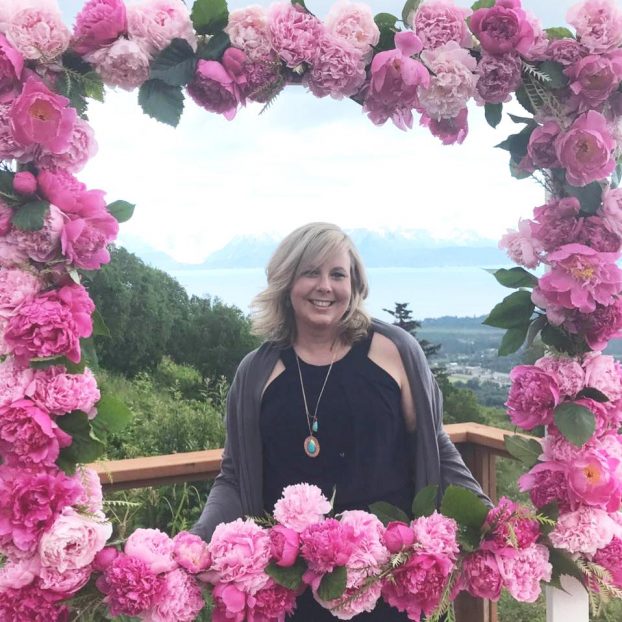
Kelly Shore, framed by Alaska peonies grown by Scenic Place Peonies in Homer, Alaska
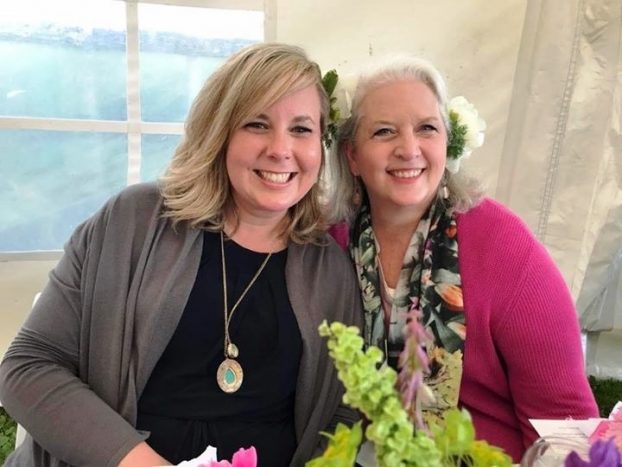
Fun times in the 49th State and the Land of Peonies, with my Slow Flowers sister, Kelly Shore
Earlier this week, I returned home from five glorious days spent in Homer, Alaska, which has become one of my favorite places in the world. It was my fourth trip to Alaska in five years and my third to Homer, where peony farmers and Slow Flowers members Beth Van Sandt and Kurt Weichhand of Scenic Place Peonies offered me the most generous hospitality and friendship.
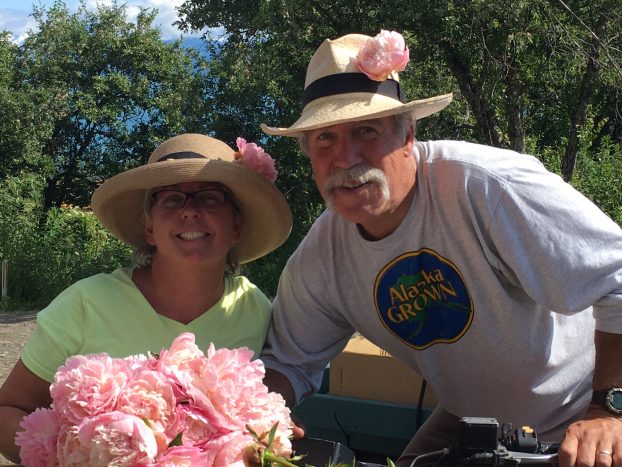
Alaskan Grown, our hosts: Beth Van Sandt and Kurt Weichhand of Scenic Place Peonies.
If you haven’t met this flower farm, here are two podcast episodes from our archives worth listening to:
Episode 282: News from the Alaska Peony Growers Association, including a conversation with Beth Van Sandt
Episode 154: Debra and Christina’s Alaska Peony Adventure, including Christina Stembel and Beth Van Sandt
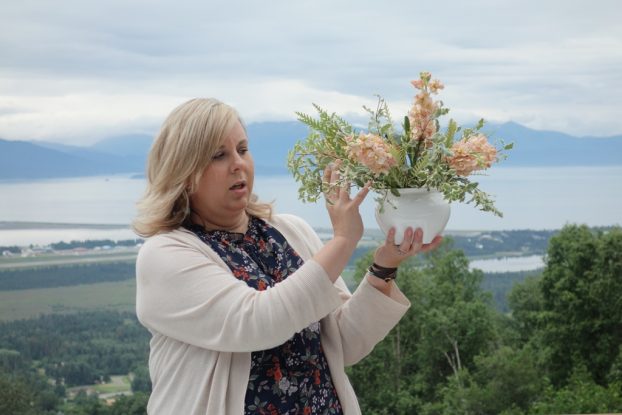
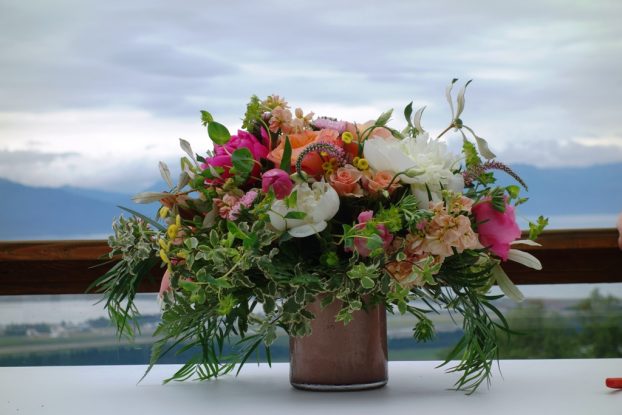
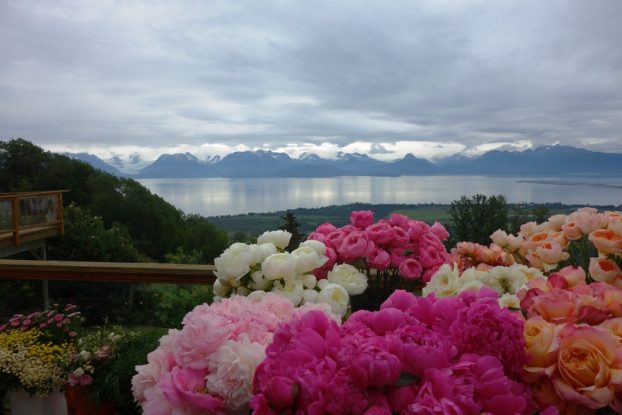
Peonies and Glaciers = Homer, Alaska Beauty that inspires today’s guest, Kelly Shore
I was surrounded by flowers — not just peonies, which of course, steal the show, but all sorts of naturally and cultivated beauty in their high tunnels and the gardens around their home, as well as along the fields’ edges.
That beauty also lured today’s guest to Scenic Place Peonies and I couldn’t pass up a chance to record this interview with Kelly Shore, owner of Petals by the Shore, based in Olney, Maryland.
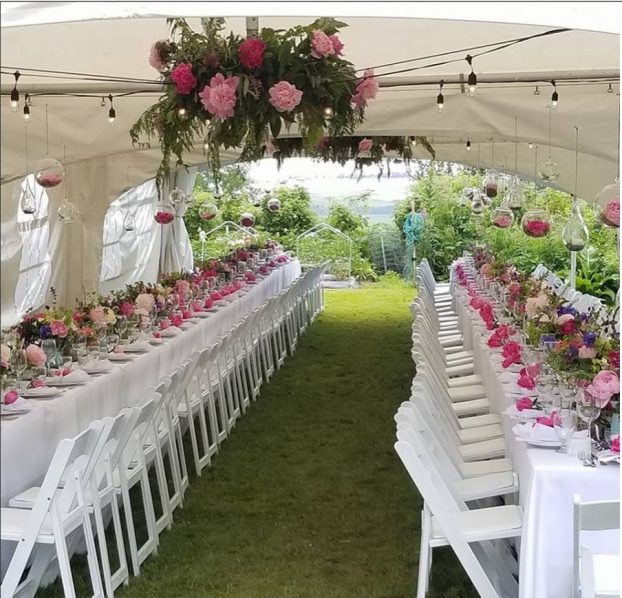
A sneak peek at the setting where last weekend’s peony-filled F2V dinner took place
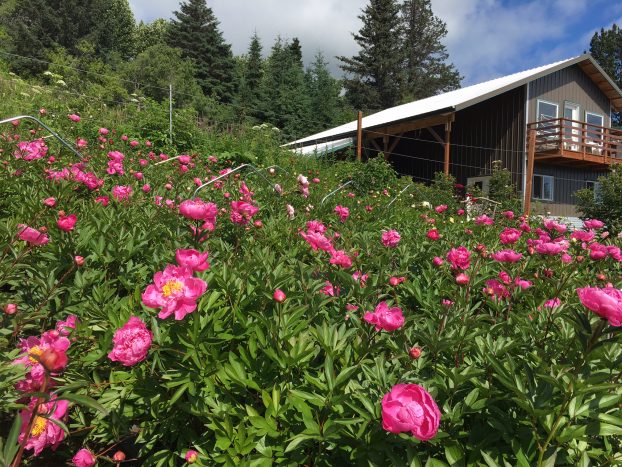
The abundant fields at Scenic Place Peonies
As the featured floral designer for last weekend’s Field to Vase Dinner, produced by the Certified American Grown program, to which Scenic Place Peonies belongs, Kelly Shore brought passion, sensitivity, respect and love to everything she touched. The tablescapes incorporated both peonies and other foraged and cultivated botanicals — all from Scenic Place Peonies. And beyond that, Kelly shared Beth’s vision that the table designs reflect a sense of place, of Homer itself, of the fishing culture there, and of the rugged beauty of the state of Alaska.
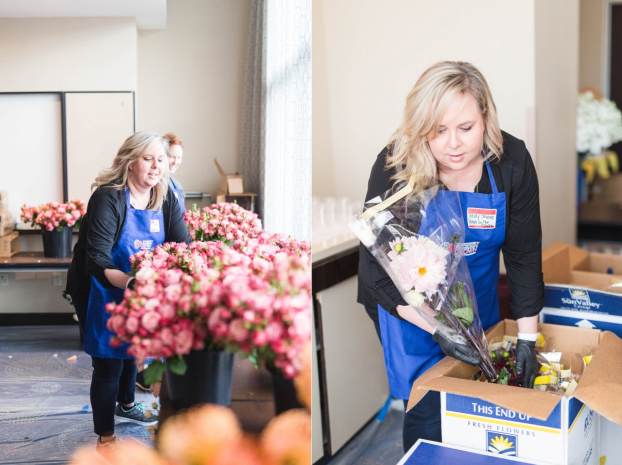
Kelly Shore, on site in Washington, D.C., this past May, as part of the lead team of designers who created the First Lady’s Luncheon florals.
Here’s a little more about Kelly. Much of this introduction is excerpted from the January 2017 article I wrote for Florists’ Review magazine, which accompanied an extensive gallery of photography, called “Four Seasons of Floral Design.”
Kelly Shore began shopping at the local farmers’ market in her community several years ago. She was enchanted by the unique, fresh, just-picked flowers on offer and struck up friendships with the vendors, becoming a regular customer at the Olney Farmers & Artists Market, located in Olney, Maryland.
Having begun her career at the University of Illinois Urbana-Champaign campus flower shop in 2000, Kelly later worked in retail and freelanced as a wedding and event floral designer, while her boyfriend (now husband, Joe Shore) was deployed in Iraq.
Kelly and Joe moved to the Washington, DC area in 2010, where she expected to put her Education M.A. to work as a teacher. But classroom positions were hard to find, so she returned to floristry, not realizing it would become her lifelong profession.
Through friendships with other florists, she networked, studied and expanded her wedding and event floral design business, Petals by the Shore.
Petals by the Shore serves wedding clients in Maryland, Washington, D.C., Virginia and Pennsylvania, a densely-populated area where, Kelly says, “everybody seems to come back to when they get married.”
Kelly and I met briefly in 2014 when I spoke at the Chapel Designers’ New York Conference, but our friendship and mutual admiration has been cemented in 2017, thanks to the many ways our work has overlapped.
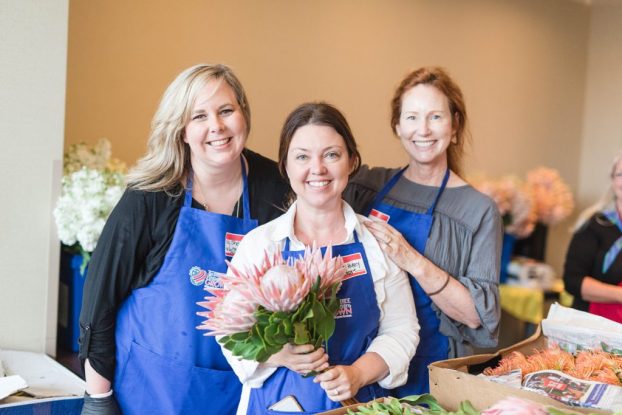
Kelly, Christy and Margaret formed the lead design team for the 2017 First Lady’s Luncheon. (c) Susie and Becky Photography
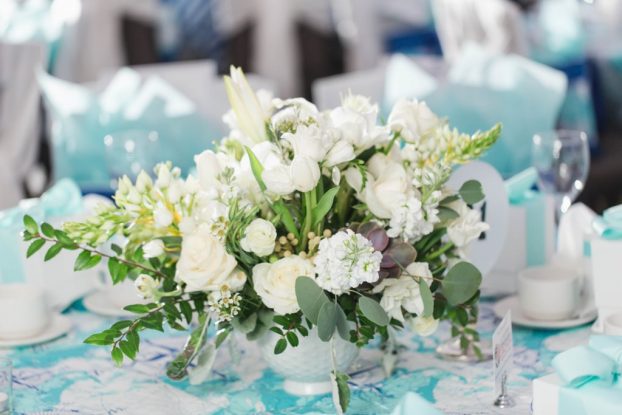
Some of the First Lady’s Luncheon florals created by Kelly and the team.
A few months after we collaborated on the Florists’ Review article, I was asked to recommend a floral designer to take the lead on the First Lady’s Luncheon, a time-honored, nonpartisan event that is presented by the Congressional Club. 2017 was to be the second time that Certified American Grown flowers were donated and designed for this luncheon and I immediately thought of Kelly as a candidate for the role. She joined the project and collaborated with Margaret Lloyd of Margaret Joan Florals, and Christy Hulsey of Colonial House of Flowers, two other Slow Flowers members who’ve designed for past Certified American Grown events.
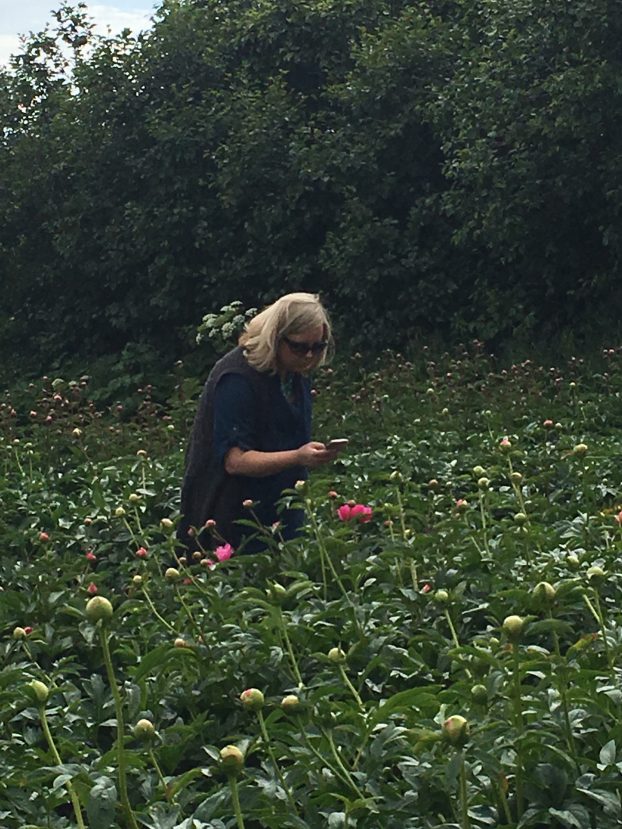
This is one of my fav pics of Kelly, snapped while she wasn’t looking — and while she was Instagramming a peony that caught her fancy at neighboring peony farm, Chilly Root
I have to say, I think Kelly felt like it couldn’t get any better than being part of the featured design team at the First Lady’s Luncheon . . . and then she was invited to take on the peony-themed decor for the Field to Vase Dinner in Homer last weekend.
What a year she’s had and I think you’ll be inspired by her story, her commitment to working with flower farmers whenever she can, and her vision for changing how wedding and event flowers are sourced and used.
Thanks again for joining me today and sharing in Kelly’s enthusiasm about American grown flowers — from Maryland to Alaska and everywhere between.
Here’s how to find and connect with Kelly Shore:
Petals by the Shore on Facebook
Petals by the Shore on Instagram
Petals by the Shore on Twitter
Petals by the Shore on Pinterest
Here’s how to find and connect with Scenic Place Peonies
Scenic Place on Facebook
Scenic Place on Instagram

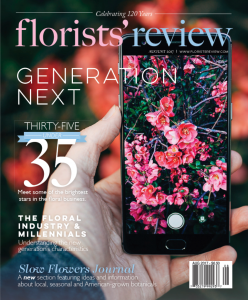 I invite you to share your story, too — I’d love to hear it! You can find more stories about floral designers and farmer-florists in the inaugural issue of the Slow Flowers Journal — print edition — out now in the August issue of Florists’ Review.
I invite you to share your story, too — I’d love to hear it! You can find more stories about floral designers and farmer-florists in the inaugural issue of the Slow Flowers Journal — print edition — out now in the August issue of Florists’ Review.
Look for the August issue at Floral Supply Syndicate and your local wholesale florist, or take advantage of the special subscription offer that Florists’ Review has shared — 12 issues for $21 (which is 62% off the cover price) and I promise you that you’ll find inside each Slow Flowers Journal, our mini-magazine, the stories, news and resources important to you.
The Slow Flowers Podcast has been downloaded more than 217,000 times by listeners like you. Thank you to each one of you for downloading, listening, commenting and sharing. It means so much.
If you value the content you receive each week, I invite you to show your thanks and support the Slow Flowers Podcast with a donation — the button can be found on our home page in the right column. Your contributions will help make it possible to transcribe future episodes of the Podcast.
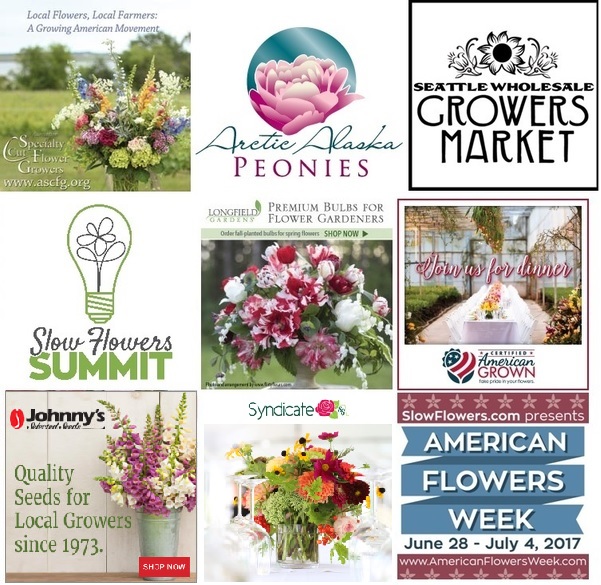 Thank you to family of sponsors for 2017:
Thank you to family of sponsors for 2017:
Certified American Grown Flowers. The Certified American-Grown program and label provide a guarantee for designers and consumers on the source of their flowers. Take pride in your flowers and buy with confidence, ask for Certified American Grown Flowers. To learn more visit americangrownflowers.org.
Arctic Alaska Peonies, a cooperative of 50 family farms in the heart of Alaska providing high quality, American Grown peony flowers during the months of July and August. Visit them today at arcticalaskapeonies.com
Seattle Wholesale Growers Market, a farmer-owned cooperative committed to providing the very best the Pacific Northwest has to offer in cut flowers, foliage and plants. The Growers Market’s mission is to foster a vibrant marketplace that sustains local flower farms and provides top-quality products and service to the local floral industry. Find them at seattlewholesalegrowersmarket.com
Longfield Gardens provides home gardeners with high quality flower bulbs and perennials. Their online store offers plants for every region and every season, from tulips and daffodils to dahlias, caladiums and amaryllis. Visit them at lfgardens.com.
Syndicate Sales, an American manufacturer of vases and accessories for the professional florist. Look for the American Flag Icon to find Syndicate’s USA-made products and join the Syndicate Stars loyalty program at syndicatesales.com.
Johnny’s Selected Seeds, an employee-owned company that provides our industry the best flower, herb and vegetable seeds — supplied to farms large and small and even backyard cutting gardens like mine. Check them out at johnnysseeds.com.
Association of Specialty Cut Flower Growers. Formed in 1988, ASCFG was created to educate, unite, and support commercial cut flower growers. It mission is to help growers produce high-quality floral material, and to foster and promote the local availability of that product. Learn more at ascfg.org
 I’m Debra Prinzing, host and producer of the Slow Flowers Podcast. Next week, you’re invited to join me in putting more American grown flowers on the table, one vase at a time. And If you like what you hear, please consider logging onto Itunes and posting a listener review.
I’m Debra Prinzing, host and producer of the Slow Flowers Podcast. Next week, you’re invited to join me in putting more American grown flowers on the table, one vase at a time. And If you like what you hear, please consider logging onto Itunes and posting a listener review.
The content and opinions expressed here are either mine alone or those of my guests alone, independent of any podcast sponsor or other person, company or organization.
The Slow Flowers Podcast is engineered and edited by Andrew Brenlan. Learn more about his work at KineticTreeFitness.com.
Posted in American Flowers Week, American Grown, Blog Posts, Creativity, Entertainment, floral design, Flower Farming, Podcast Episodes, SLOW FLOWERS Podcast, Slowflowers.com the Directory of American Flowers, Storytelling | 6 Comments »
August 1st, 2017

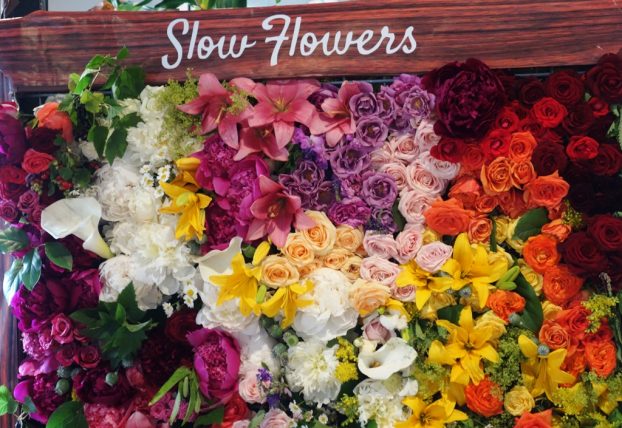 It’s hard to believe that one month ago, nearly 100 of us gathered together in Seattle for the first Slow Flowers Summit. Before too much time passes, I want to personally thank you everyone who attended and invested their time and presence in sharing this incredible experience with me and others in the Slow Flowers Movement!
It’s hard to believe that one month ago, nearly 100 of us gathered together in Seattle for the first Slow Flowers Summit. Before too much time passes, I want to personally thank you everyone who attended and invested their time and presence in sharing this incredible experience with me and others in the Slow Flowers Movement!
Here are a few of the Raves we’ve received to date:
The Slow Flowers Summit was a great platform for discussing important issues, the most important for me being diversity and inclusivity in the business. . . a fantastic event with something for everyone that didn’t shrink from the more challenging issues facing us.
The Slow Flowers Summit was hugely inspiring to me as a grower and an entrepreneur. It was a wonderful opportunity to meet other like-minded people who are successfully uniting their passion for flowers with a vision for a better world.
The Summit offered a day of inspiration and conversations. Being in the presence of other men and women who are passionate about their craft and the world behind the flowers was inspiring and uplifting. The value of the people that I met, the conversations that we united around, and the ideas that I left with made the day invaluable. I hope to be back year after year.
My participation in the Summit has sparked new ideas regarding how I grow my business. I’m inspired to think bigger and connect with a larger audience of like-minded flower people.
Thank you to our presenters for their intelligence, ideas and wisdom:
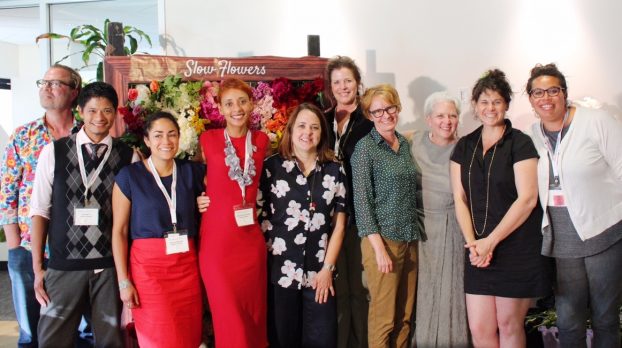
Above, from left: James Baggett, Riz Reyes, Nicole Cordier Wahlquist, Chantal Aida Gordon, Emily Ellen Anderson, Teresa Sabankaya, Amy Stewart, Debra Prinzing, Lisa Waud and Leslie Bennett

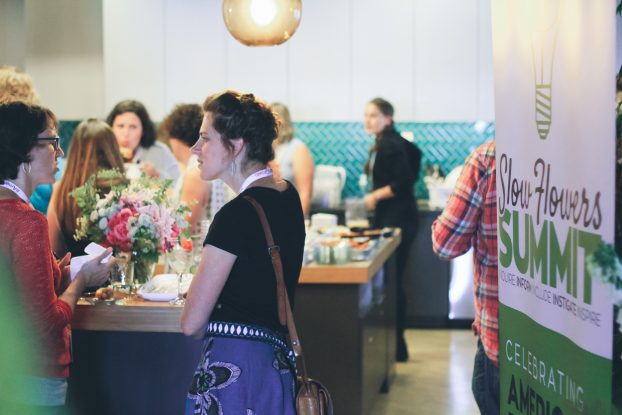 Who attended? Here’s a breakdown of how attendees identified themselves* in our post-Summit survey:
Who attended? Here’s a breakdown of how attendees identified themselves* in our post-Summit survey:
Florist/Floral Designer: 50 percent
Flower Farmer/Farmer-Florist: 27 percent
Educator: 14 percent
Media: 10 percent
Flower Gardener/Floral Enthusiast: 10 percent
Other categories: Wholesale floral managers, horticulturists, online floral retailer
*respondents were allowed to choose more than one category
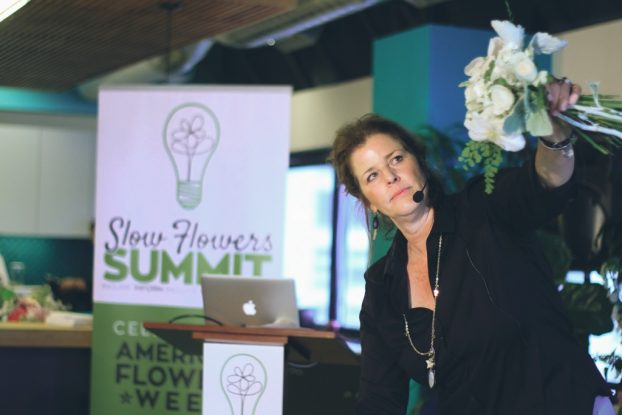
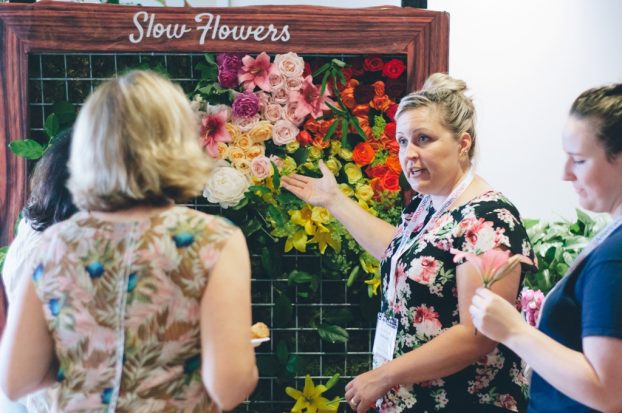 We asked: “Was the Summit content relevant to you and your business?” Attendees ranked this answer 4.22 out of 5.0
We asked: “Was the Summit content relevant to you and your business?” Attendees ranked this answer 4.22 out of 5.0
We asked: “What elements of the Summit were valuable to you? Attendees ranked these choices as follows:
1. Connecting with other Attendees
2. Connecting with Speakers
3. Learning about new Resources & Skills
4. Playing with Flowers (Flower Wall and Flowers on Your Head)
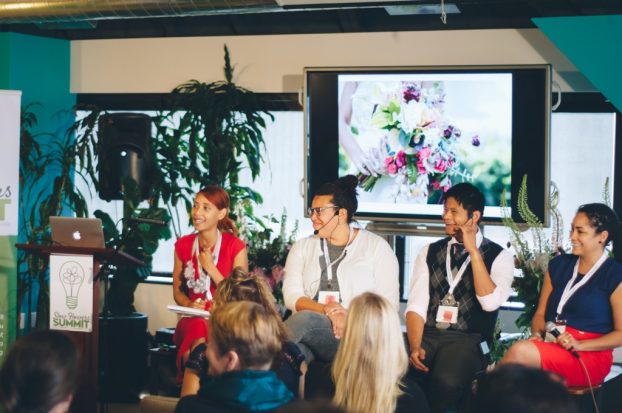
Panelists, from left: Chantal Aida Gordon of thehorticult.com blog; Leslie Bennett of Pine House Edible Gardens; Riz Reyes of RHR Horticulture; and Nicole Cordier Wahlquist of Grace Flowers Hawaii
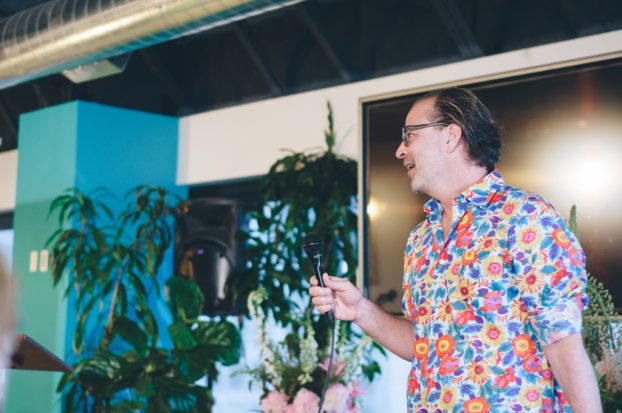
Our Master of Ceremonies, James Baggett of Better Homes & Gardens magazine.
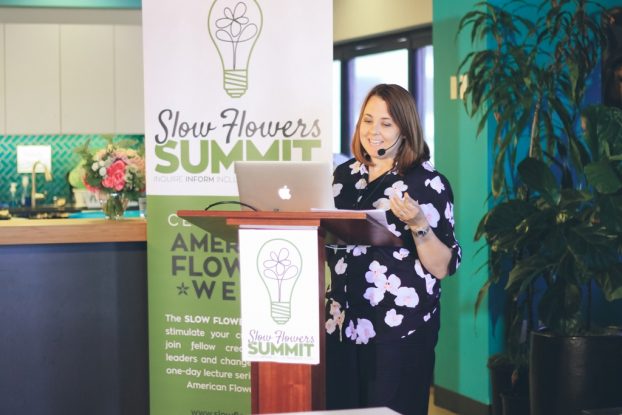
Emily Ellen Anderson of Lola Creative
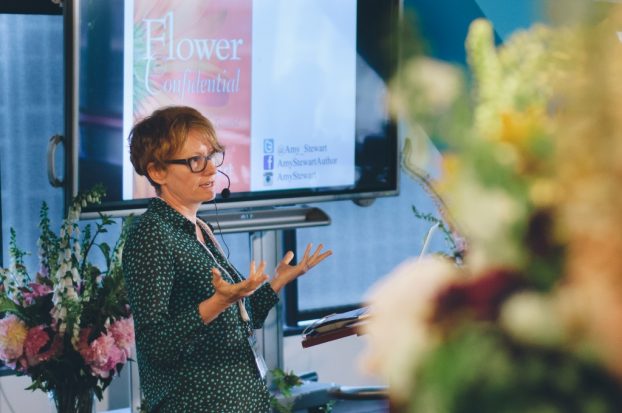
Keynote speaker Amy Stewart, author of Flower Confidential and many other bestselling titles.
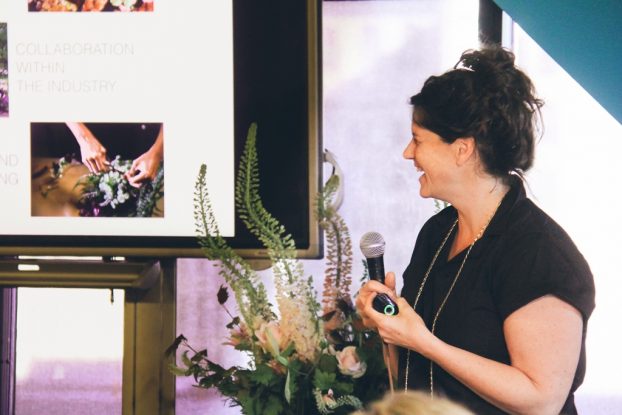
Lisa Waud of pot & box, Flower House Detroit and Detroit Flower Week
Enjoy our PICTURES!! Summit photos are here for your enjoyment and use. Follow this link to see/download.
Please credit (c) Hannah Brenlan and Luke Holtgeerts and use these hashtags: #slowflowersummit #americanflowersweek when you use any of these images. Thank you!
READ THIS. #SlowFlowerSummit 2017 is a HIT!
I loved reading one attendee’s thoughtful response with her takeaways from the Summit. Kit Wertz of Los Angeles-based Flower Duet wrote an extensive review in her July newsletter. You’ll want to subscribe to her newsletter! Thanks, Kit!
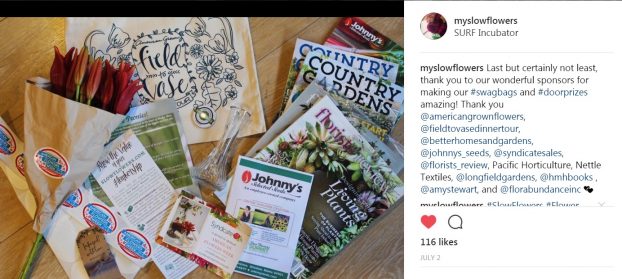 I can’t close without thanking all of our Sponsors and Volunteers.
I can’t close without thanking all of our Sponsors and Volunteers.
I especially want to thank Stephanie Downes of Vanita Floral, @vanitafloral, our Event Manager Extraordinaire, and Niesha Blancas @nieshamonay, our Social Media Maven, from Poppy Social Media.
Seriously. Could. Not. Have. Done. The. Summit. Without. Them. xoxo
Our Audio/Visual Team was the best! Thank you to Hannah and Andrew Brenlan and the Brothers Holtgeerts (Henry and Luke).
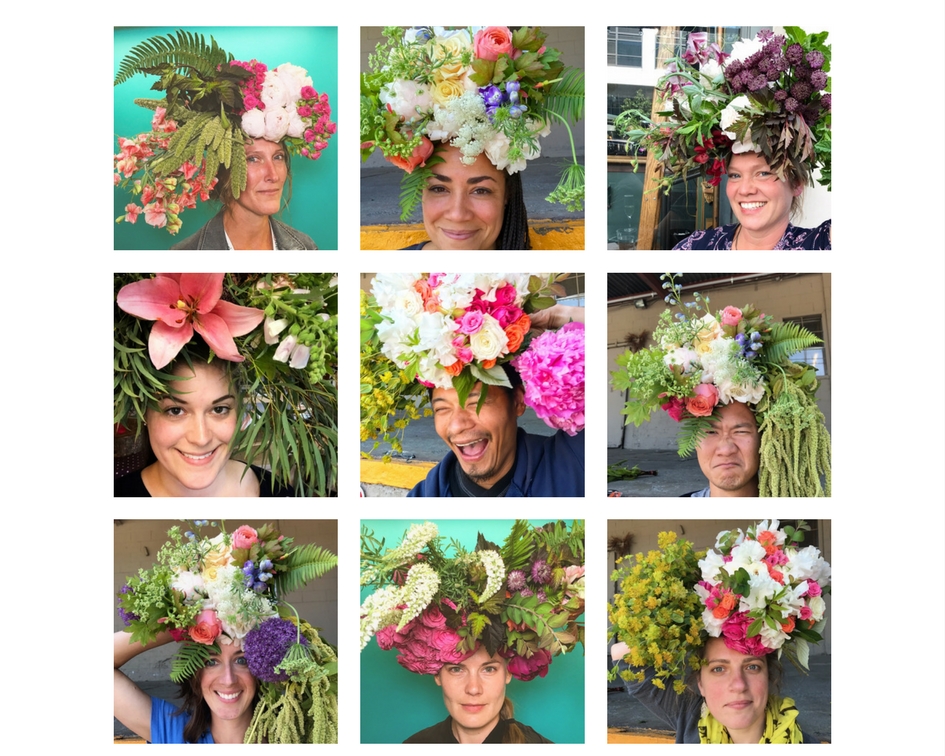
A few of the many flowered and beautiful heads, thanks to Mud Baron for Flowers on Your Head
Thanks to Mud Baron of Muir Ranch for adding a festive, Instagram-worthy “flowers on your head” element to the day!
I’ve received personal notes from so many of you — and I promise to write back as time allows. I hope to announce a save-the-date for our 2018 Summit — on the East Coast — very soon.
Until then, continue to Inquire, Inform, Include, Instigate and Inspire!
Posted in American Flowers Week, American Grown, Creativity, Entertainment, floral design, Playfulness, Slowflowers.com the Directory of American Flowers, Spiritual Practices, Storytelling, Writing | 3 Comments »
July 26th, 2017
Podcast: Play in new window | Download
Subscribe: Apple Podcasts | Podcast Index | | More
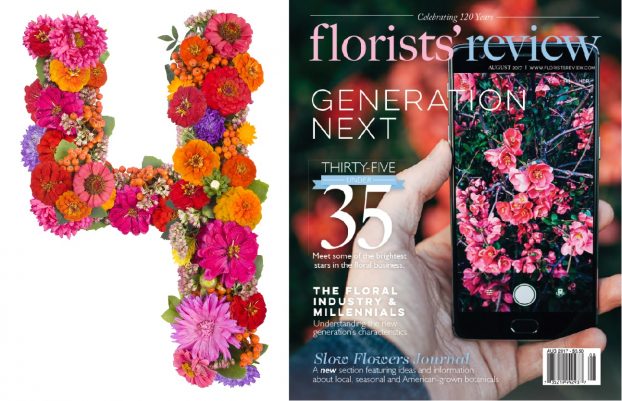
I’m celebrating the 4th anniversary of the Slow Flowers Podcast with a special guest and big announcement!
On July 23, 2014, I said this at the top of the Slow Flowers Podcast:
During the past year, I produced and hosted weekly episodes of this podcast — with news and insights of the American Grown flower movement.
The people who have been guests on this series have generously and passionately shared their time and knowledge.
Our inspiring and straight-forward dialogue has prompted thousands of listeners to return, week after week, downloading the audio files to their various devices, to listen in the design studio, in the flower fields and wherever else they spend their days.
The Slow Flowers Podcast is now a must-hear medium connecting listeners across our country with creative and influential voices and exciting points of view.
Thank you for joining me and please get ready for the next 52 weeks of great conversations.
We’re in full bloom, so to speak, and there’s an abundance of great information I’m eager to bring you!
That’s how I pronounced the news of this Podcast’s one-year anniversary, with 15,000 downloads and, as I said, 52 episodes to show for it.
 Here we are, today, celebrating the 4th anniversary of the Slow Flowers Podcast, and by numbers alone, we’ve made some amazing strides. We have enjoyed 215,000 listener downloads, and have produced 208 episodes.
Here we are, today, celebrating the 4th anniversary of the Slow Flowers Podcast, and by numbers alone, we’ve made some amazing strides. We have enjoyed 215,000 listener downloads, and have produced 208 episodes.
Behind the numbers are authentic relationships that have been formed, a community of like-minded kindred spirits who are truly trying to improve our floral landscape.
We are making empowered decisions about how flowers are grown, brought to market and incorporated into our designs, decisions that affect our branding and businesses in a positive way.
Your participation in and support of all Slow Flowers projects is at an all-time high. With more than 715 members of Slowflowers.com, with ever-increasing support and collaboration with many of our sponsors, with the explosion of involvement in American Flowers Week — at more than 5 million impressions on social media during this year’s campaign, with the media attention not just about our program but about flower farmers across the country creating wholesale supply hubs and elevating the discussion about local flowers, and with this year’s amazing Slow Flowers Summit just occurring . . . well, we have so much to celebrate.
Let’s pop the cork and congratulate one another. Like a true community, your success equals my success; when the light is shined on one member, it benefits all members; when together we value interdependence over competition . . . that’s what inspires me and I hope it inspires you.
Four years ago, I started this tiny podcast wondering how I would ever “fill” the lineup with enough guests and stories to tell, imagining that eventually, I would be scrambling to find people to interview week after week. Well, that has proven NOT to be the case and it is pretty beautiful to acknowledge this accomplishment. My instinct for news tells me that the pool of voices to bring to you — as we inquire, inform, include, inspire and instigate new thinking — will not disappear. That’s a promise.
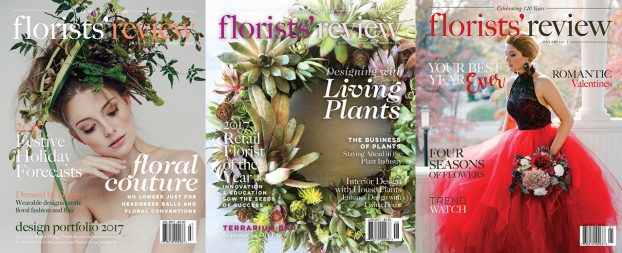
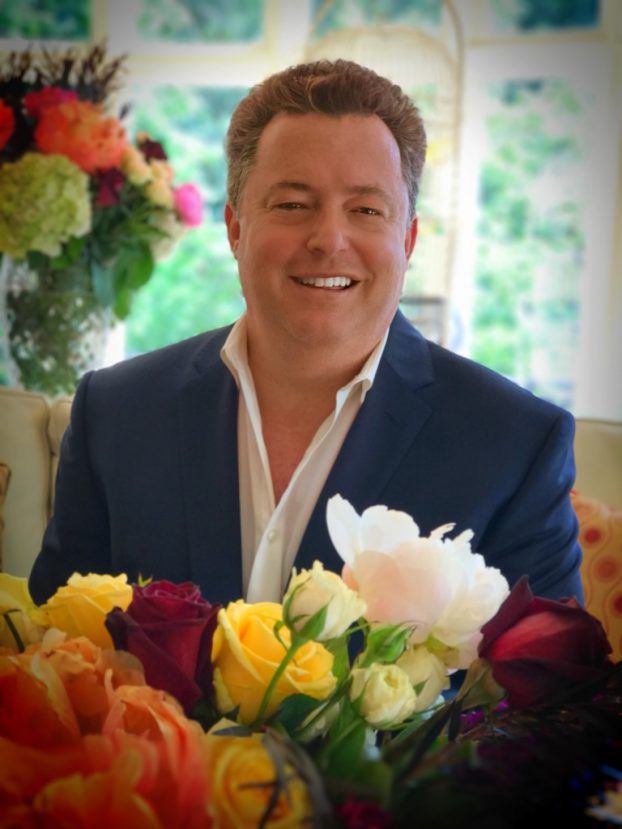
Travis Rigby, president and publisher of Florists’ Review
There’s one more big accomplishment to share and it is happening thanks to today’s special guest.
Please meet Travis Rigby, president and publisher of Wildflower Media, the parent company of Florists’ Review, Super Floral and an extensive bookstore and publishing operation.
Travis also is president of two companies both based in Portland — PosterGarden.com, a portable display company founded in 1995, and FlowerBox (formerly Blumebox), an innovative flower vase company specializing in recyclable vases.
Travis purchased Florists’ Review Enterprises and its suite of businesses in early 2016, with the sale closing on April 1 last year, so he has less than 18 months as a magazine publisher under his belt.
He acquired the Topeka, Kansas-based business from Frances Dudley, the previous owner of 29 years, but I was amazed to learn that Florists’ Review is a venerable, 120-year-old trade magazine.
 Florists’ Review has been serving the floral industry for nearly 120 years. Established by Gilbert Leonard Grant in 1897 as The Weekly Florists’ Review, it was the first floral magazine to use photography rather than sketches, giving florists a true picture of what was happening in their industry.
Florists’ Review has been serving the floral industry for nearly 120 years. Established by Gilbert Leonard Grant in 1897 as The Weekly Florists’ Review, it was the first floral magazine to use photography rather than sketches, giving florists a true picture of what was happening in their industry.
Even during his short period of ownership, Travis has made some exciting changes, including redesigning Florists’ Review, with a larger-size format, higher quality paper and fresh graphics. With David Coake as editor and Kathleen Dillinger as new art director, together the cover and inside content of Florists’ Review are catching people’s attention.
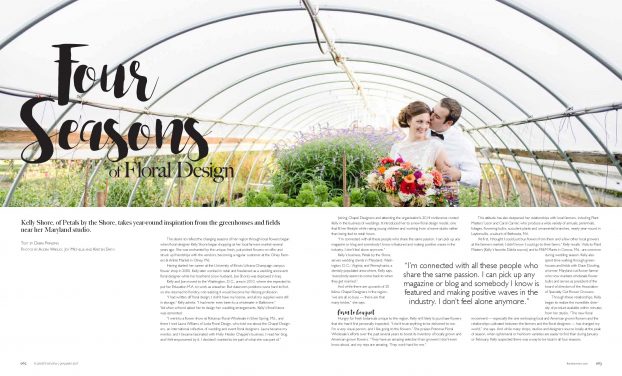
“Four Seasons of Floral Design” featured designs from Kelly Shore of Petals by the Shore in Olney, Maryland, and flowers from Plant Masters flower farm.
I began contributing articles to the magazine this past January, auspicious timing for me because it coincided with the magazine’s beautiful new format. As you’ll hear in our conversation, Travis and I met through a mutual friend, the uber networker Heidi Berkman of The Bloom Project in Portland (who incidentally you’ll hear on this podcast in the not-so-distant future).
Being the magazine junkie that I am, I was immediately fascinated to meet Travis and talk about the future of print media. The magazine world has undergone a huge shakeup in the past decade, as has all print, especially newspapers, but Travis and I found ourselves agreeing that there is a sweet spot for micro-niche publications that really drill down on a focused topic or serve a distinct audience — and that Florists’ Review had the potential to become the publication of choice for the mainstream floral industry. Of course, I’m not really in the mainstream, preaching local and seasonal flowers, but Travis saw something of relevance in the Slow Flowers platform, and he continued to say “yes” when I brought story ideas to the table.
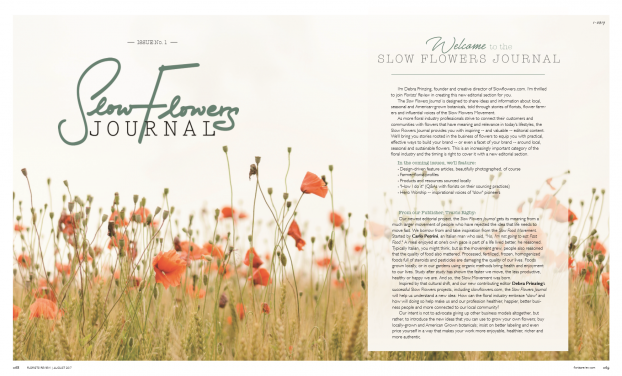
Here’s a sneak peek of our opening pages of the Slow Flowers Journal — launching inside the August issue of Florists’ Review.

Now, thanks to a new partnership, more than 13k subscribers of Florists Review will read regular coverage about the Slow Flowers Movement and the people who grow and design with local, seasonal and domestic flowers. Beginning in August, next week, I am joining Florists’ Review as a Contributing Editor and, you will find our dedicated editorial section called Slow Flowers Journal inside the pages of Florists’ Review magazine, the highest-circulation floral industry trade magazine on the market.
In the coming issues, we’ll feature:
- Design-driven feature articles, beautifully photographed, of course
- Farmer-florist profiles
- Products and resources sourced locally
- “How I do it” (Q&As with florists on their sourcing practices)
- Hero Worship — inspirational voices of “slow” pioneers
Isn’t that cool? Now even more readers will learn about the #slowflowersmovement and how they can adapt and adopt a more sustainable lifestyle in the floral industry.
Want to see what it’s all about?
Subscribe to Florists’ Review and read our bonus Slow Flowers Journal content at the special rate of $21 for 12 issues — 62 percent off the cover price! Take advantage of the special subscription offer from Florists’ Review. Click on this link or call 1-800-367-4708. I promise you that you’ll find inside each Slow Flowers Journal, our mini-magazine, the stories, news and resources important to you.
Thanks again for joining me and for helping me celebrate all the good Slow Flowers news of this Podcast’s significant fourth anniversary. If you want to get more involved, please reach out — I’d love to hear from you!
Join the Slow Flowers Community on Facebook, and share your story of this ever-changing ethos to source domestic, American grown flowers and support flower farmers, as well as adopt a more mindful, sustainable lifestyle for you and your business.
As I mentioned, the Slow Flowers Podcast has been downloaded nearly 215,000 times by listeners like you. Thank you to each one of you for downloading, listening, commenting and sharing. It means so much.
If you value the content you receive each week, I invite you to show your thanks and support the Slow Flowers Podcast with a donation — the button can be found on our home page in the right column. Your contributions will help make it possible to transcribe future episodes of the Podcast.
 Thank you to family of sponsors:
Thank you to family of sponsors:
Arctic Alaska Peonies, a cooperative of 50 family farms in the heart of Alaska providing high quality, American Grown peony flowers during the months of July and August. Visit them today at arcticalaskapeonies.com
Seattle Wholesale Growers Market, a farmer-owned cooperative committed to providing the very best the Pacific Northwest has to offer in cut flowers, foliage and plants. The Growers Market’s mission is to foster a vibrant marketplace that sustains local flower farms and provides top-quality products and services to the local floral industry. Find them at seattlewholesalegrowersmarket.com
Longfield Gardens provides home gardeners with high quality flower bulbs and perennials. Their online store offers plants for every region and every season, from tulips and daffodils to dahlias, caladiums and amaryllis. Visit them at lfgardens.com.
Syndicate Sales, an American manufacturer of vases and accessories for the professional florist. Look for the American Flag Icon to find Syndicate’s USA-made products and join the Syndicate Stars loyalty program at syndicatesales.com.
Johnny’s Selected Seeds, an employee-owned company that provides our industry the best flower, herb and vegetable seeds — supplied to farms large and small and even backyard cutting gardens like mine. Check them out at johnnysseeds.com.
Association of Specialty Cut Flower Growers. Formed in 1988, ASCFG was created to educate, unite, and support commercial cut flower growers. Its mission is to help growers produce high-quality floral material, and to foster and promote the local availability of that product. Learn more at ascfg.org.
I’m Debra Prinzing, host and producer of the Slow Flowers Podcast. Next week, you’re invited to join me in putting more American grown flowers on the table, one vase at a time. And If you like what you hear, please consider logging onto Itunes and posting a listener review.
The content and opinions expressed here are either mine alone or those of my guests alone, independent of any podcast sponsor or other person, company or organization.
The Slow Flowers Podcast is engineered and edited by Andrew Brenlan. Learn more about his work at KineticTreeFitness.com.
Music Credits:
Posted in Blog Posts, Creativity, floral design, Flower Farming, General, Podcast Episodes, SLOW FLOWERS Podcast, Slowflowers.com the Directory of American Flowers, Storytelling, Writing | 1 Comment »
July 19th, 2017
Podcast: Play in new window | Download
Subscribe: Apple Podcasts | Podcast Index | | More
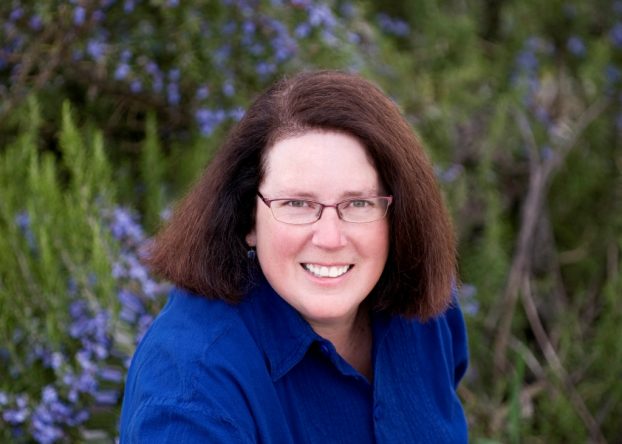
Linda Beutler, clematis expert, floral designer and author. (c) Loma Smith photograph

Linda is the author of The Plant Lover’s Guide to Clematis.
Last week, we heard from Rebecca Reed, U.S. Sales Executive for David Austin Garden Roses.
I learned so much from Rebecca about these beloved and increasingly popular roses for both the landscape and floral arranging and if you haven’t listened yet, head on over to Episode 305. It’s the perfect lead-in for today’s equally fabulous topic: Clematis.
Because so many of my friends are involved in the Pacific Northwest horticulture community and because I once was deeply embedded in it, serving as the Northwest Horticultural Society’s “Garden Notes” newsletter editor for several years, I have been vaguely aware of the existence of a rare clematis collection taking root outside Portland, Oregon. But I’d never visited the garden where it was housed.
Then last year, I met Phyllis McCanna while speaking to the Portland Garden Club, and she asked me to visit — more than once. Phyllis was gently persuasive with her warm invitations and about a month ago when I found myself driving to Portland for a series of scouting appointments, I arranged to meet Phyllis and see the clematis I’d been hearing about. As it turns out, Phyllis is the board president of the Friends of the Rogerson Clematis Collection, which is located at the historic Luscher Farm, part of Lake Oswego’s Park and Recreation system, outside Portland.
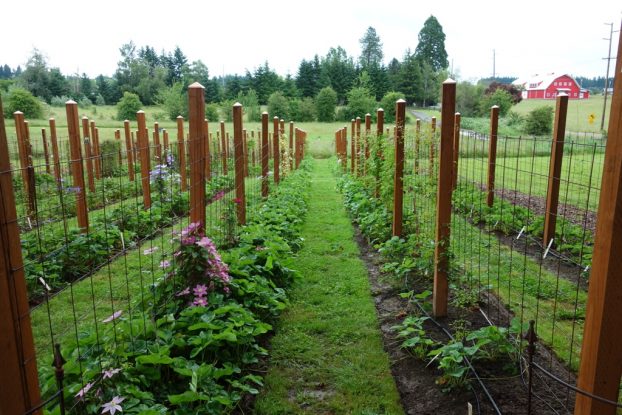
The modern clematis collection at the Rogerson Clematis Collection. I love the way it’s organized like a vineyard!
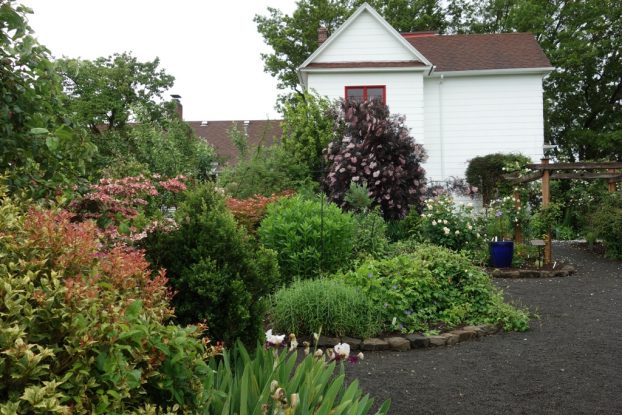
The display gardens are arranged around the historic Lescher Farmhouse and feature clematis paired with ornamental landscape plants.
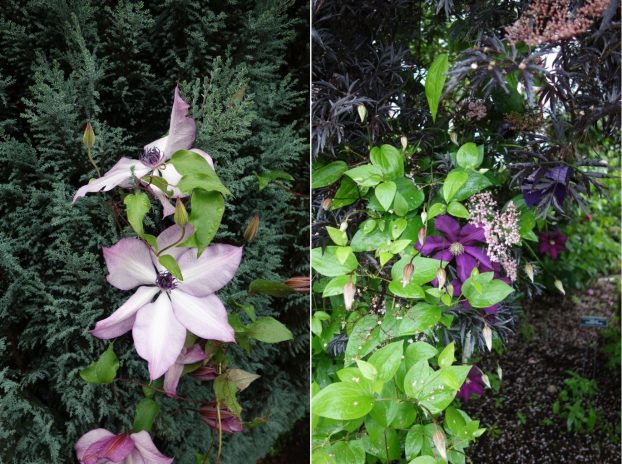
Clematis with conifers and ornamental shrubs.
The Friends group was formed in 2005 to ensure that Brewster Rogerson’s amazing collection of clematis would be maintained and nurtured over time. Since then, the collection has grown from a group of beautiful plants in pots to an assemblage of beautiful plants in a delightful garden, now North America’s foremost collection of the genus Clematis.
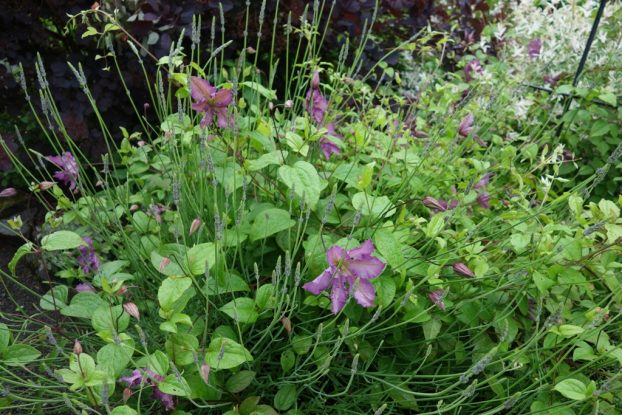
Clematis, with lavender!
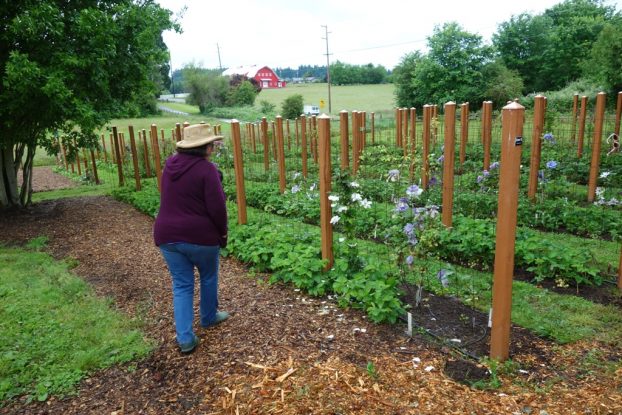
Linda led me on a tour of the modern clematis display.
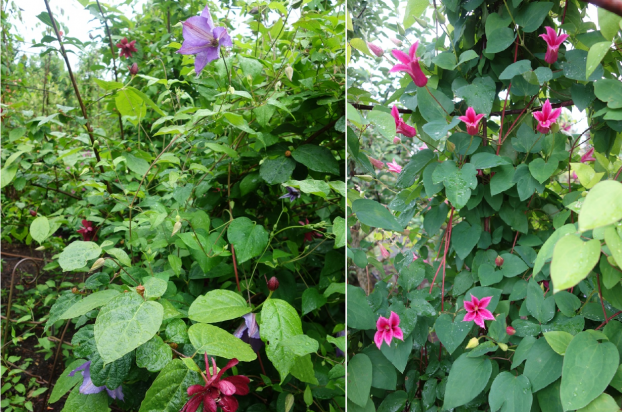
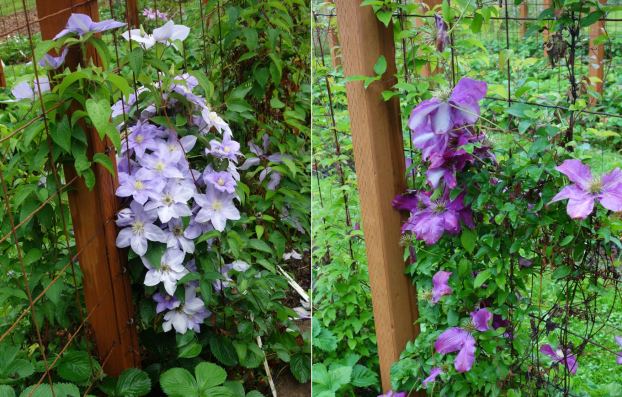 Its mission is to preserve and foster the Rogerson Clematis Collection in a permanent home, observing its longtime objectives of assembling and maintaining as comprehensive a collection of the genus Clematis as possible, for the advancement of botanical and horticultural research and education and pleasure of all who visit.
Its mission is to preserve and foster the Rogerson Clematis Collection in a permanent home, observing its longtime objectives of assembling and maintaining as comprehensive a collection of the genus Clematis as possible, for the advancement of botanical and horticultural research and education and pleasure of all who visit.
I was delighted to reconnect with Phyllis and with my guest today Linda Beutler. Linda is a fifth generation Oregonian and lifelong gardener, who left floral design in 2007 when she signed on as the curator of the Rogerson Clematis Garden.
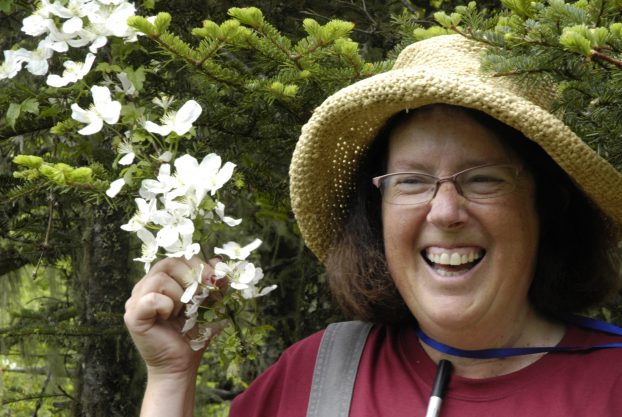 She is the author of several books, including Garden to Vase, Growing and Using your own Cut Flowers, which Timber Press published in 2007, now out of print but available used on Amazon and at Powell’s Books online. She also wrote Gardening with Clematis in 2004 and The Plant Lover’s Guide to Clematis, which Timber Books published last year.
She is the author of several books, including Garden to Vase, Growing and Using your own Cut Flowers, which Timber Press published in 2007, now out of print but available used on Amazon and at Powell’s Books online. She also wrote Gardening with Clematis in 2004 and The Plant Lover’s Guide to Clematis, which Timber Books published last year.
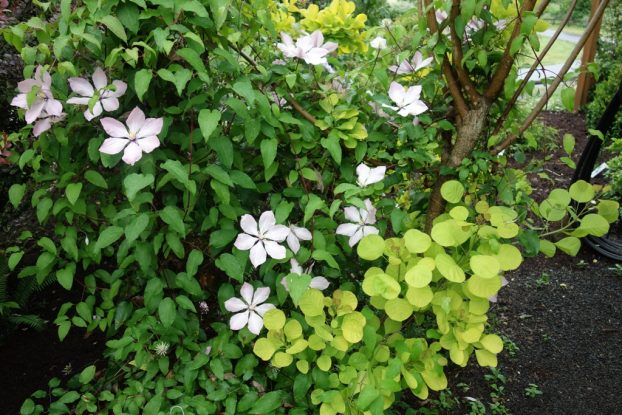
Clematis with cotinus.
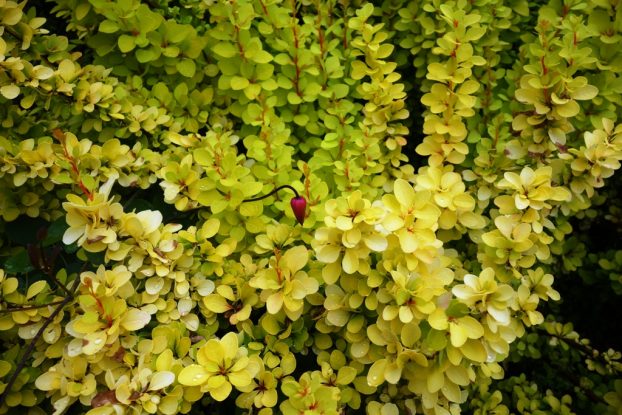
Clematis with barberry.
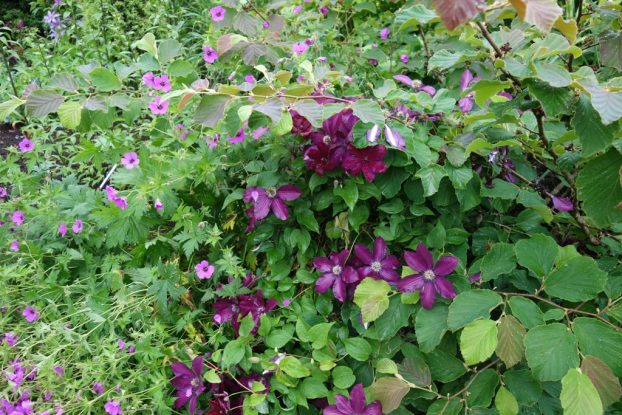
Clematis with witch hazel.
Linda’s love of gardening began with harvesting strawberries with her grandfather at the age of three, and being given her own plot for radishes and string beans at age five. Her home garden in the Sellwood neighborhood of Portland, Oregon reflects her garden passions, including old garden roses, herbaceous perennials and shrubs for cutting, and her 200 favorite clematis. Linda has been an adjunct instructor of horticulture at Clackamas Community College in Oregon City, OR since 1996. She is the current President of the International Clematis Society and has also been known to dabble in Jane Austen fan-fiction!
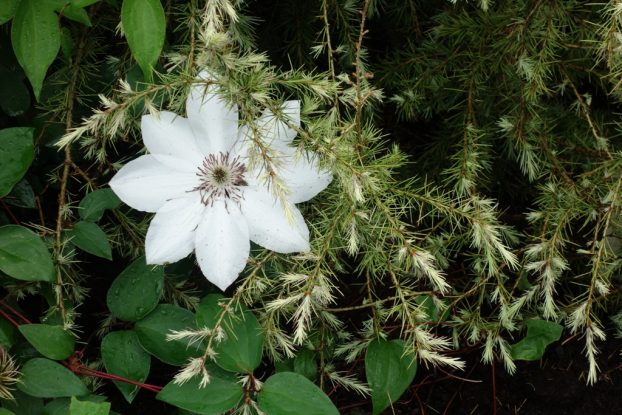 Please enjoy this conversation — and stay tuned for a bonus tip from Linda at the end of the interview. Does she or doesn’t she use rubbing alcohol to extend the vase life of her cut clematis?
Please enjoy this conversation — and stay tuned for a bonus tip from Linda at the end of the interview. Does she or doesn’t she use rubbing alcohol to extend the vase life of her cut clematis?
Enjoy my gallery of photos from my recent visit to the Rogerson Clematis Garden. Find more clematis at these social places:
Rogerson Clematis Garden on Facebook
Download the Clematis for Beginners list from International Clematis Society
The Slow Flowers Podcast has been downloaded more than 212,000 times by listeners like you.
If you value the content you receive each week, I invite you to show your thanks and support the Slow Flowers Podcast with a donation — the button can be found on our home page in the right column. Your contributions will help make it possible to transcribe future episodes of the Podcast.
 Thank you to family of sponsors
Thank you to family of sponsors
Arctic Alaska Peonies, a cooperative of 50 family farms in the heart of Alaska providing high quality, American Grown peony flowers during the months of July and August. Visit them today at arcticalaskapeonies.com
Seattle Wholesale Growers Market, a farmer-owned cooperative committed to providing the very best the Pacific Northwest has to offer in cut flowers, foliage and plants. The Growers Market’s mission is to foster a vibrant marketplace that sustains local flower farms and provides top-quality products and service to the local floral industry. Find them at seattlewholesalegrowersmarket.com
Longfield Gardens provides home gardeners with high quality flower bulbs and perennials. Their online store offers plants for every region and every season, from tulips and daffodils to dahlias, caladiums and amaryllis. Visit them at lfgardens.com.
Syndicate Sales, an American manufacturer of vases and accessories for the professional florist. Look for the American Flag Icon to find Syndicate’s USA-made products and join the Syndicate Stars loyalty program at syndicatesales.com.
Johnny’s Selected Seeds, an employee-owned company that provides our industry the best flower, herb and vegetable seeds — supplied to farms large and small and even backyard cutting gardens like mine. Check them out at johnnysseeds.com.
Association of Specialty Cut Flower Growers. Formed in 1988, ASCFG was created to educate, unite, and support commercial cut flower growers. It mission is to help growers produce high-quality floral material, and to foster and promote the local availability of that product. Learn more at ascfg.org.
 I’m Debra Prinzing, host and producer of the Slow Flowers Podcast. Next week, you’re invited to join me in putting more American grown flowers on the table, one vase at a time. And If you like what you hear, please consider logging onto Itunes and posting a listener review.
I’m Debra Prinzing, host and producer of the Slow Flowers Podcast. Next week, you’re invited to join me in putting more American grown flowers on the table, one vase at a time. And If you like what you hear, please consider logging onto Itunes and posting a listener review.
The content and opinions expressed here are either mine alone or those of my guests alone, independent of any podcast sponsor or other person, company or organization.
The Slow Flowers Podcast is engineered and edited by Andrew Brenlan. Learn more about his work at KineticTreeFitness.com.
Music Credits:
LaBranche
by Blue Dot Sessions
Clap Along
by Dave Depper
Posted in American Grown, Book reviews, Creativity, floral design, Flower Farming, Gardening, General, Landscape Design, Plants, Podcast Episodes, SLOW FLOWERS Podcast, Storytelling, Writing | No Comments »
July 12th, 2017
Podcast: Play in new window | Download
Subscribe: Apple Podcasts | Podcast Index | | More
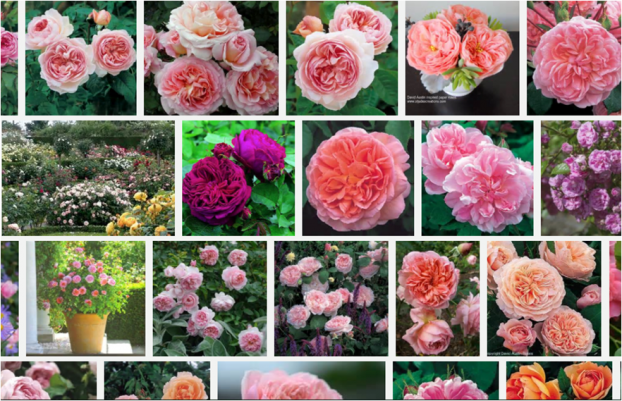
David Austin English Garden Roses are becoming more important than ever as cut flowers for floral design.
This week we’re continuing to celebrate the success of the third annual American Flowers Week, while also hearing from Rebecca Bull Reed, U.S. Sales Executive for David Austin Roses, this week’s guest.
I’m so pleased that Rebecca agreed to lecture on David Austin Garden Roses to the florists and farmers of the Seattle Wholesale Growers Market this past spring. I was able to record Rebecca’s presentation in late April and I’ve been waiting for the perfect time to share it with you.
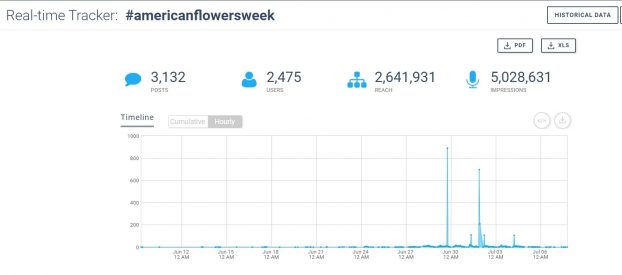 But first, let’s wrap up the news of American Flowers Week! I have new campaign numbers to share — 5 million and counting! That’s the social media impressions generated by YOU and YOUR Instagram & Twitter Posts in the past 30 days!! #AmericanFlowersWeek has exploded — just like fireworks!
But first, let’s wrap up the news of American Flowers Week! I have new campaign numbers to share — 5 million and counting! That’s the social media impressions generated by YOU and YOUR Instagram & Twitter Posts in the past 30 days!! #AmericanFlowersWeek has exploded — just like fireworks!
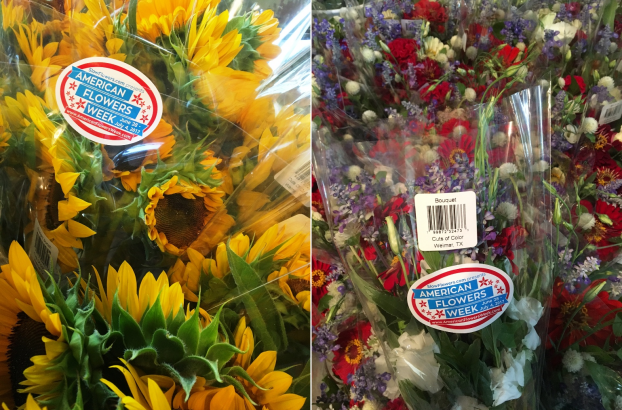
Rita Anders of Cuts of Color in Weimar, Texas, delivered American Flowers Week bouquets and bunches to Central Market stores in Houston.
In our third year, participation in AFW more than tripled the impressions generated last year, putting #americanflowersweek on the map in all 50 states!
[Imagine the true metrics if Facebook let us track hashtags? Just sayin’!]
Thank you to each one who joined in! The Slow Flowers Community has the momentum to effect change in the marketplace, so continue posting and sharing the #slowflowers message every week of the year!
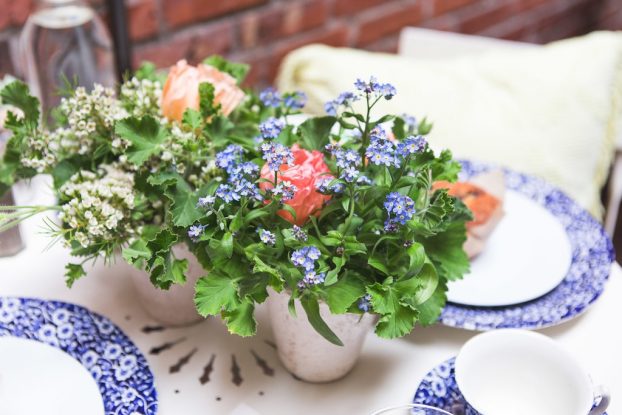
Tammy Meyers of First & Bloom outside Seattle created a beautiful styled photo shoot for American Flowers Week.
The 3rd Annual American Flowers Week has come to a close and it was our best ever! With participation across the U.S. in all sectors of the floral industry, this New Floral Holiday is waving the flag and making a splash from coast to coast.
This year, Slow Flowers, which presents American Flowers Week, commissioned five floral-inspired fashion shoots depicting iconic American grown blooms. The designers who contributed their creativity and artistic talents teamed up with generous flower farms that donated stems straight from their fields and greenhouses.
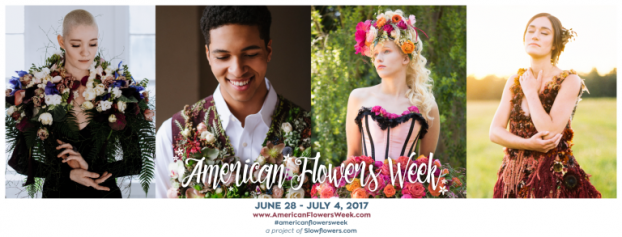 Four of the five looks are shown above. We’re saving the final look to feature in an article that will appear in the August 2017 issue of Florists’ Review — so stay tuned for the big reveal! Our All-American floral looks would never have been possible without the support of Slow Flowers’ sponsors, including Certified American Grown, Arctic Alaska Peony Cooperative, Longfield Gardens, Syndicate Sales, Seattle Wholesale Growers Market, Johnny’s Selected Seeds and Association of Specialty Cut Flower Growers.
Four of the five looks are shown above. We’re saving the final look to feature in an article that will appear in the August 2017 issue of Florists’ Review — so stay tuned for the big reveal! Our All-American floral looks would never have been possible without the support of Slow Flowers’ sponsors, including Certified American Grown, Arctic Alaska Peony Cooperative, Longfield Gardens, Syndicate Sales, Seattle Wholesale Growers Market, Johnny’s Selected Seeds and Association of Specialty Cut Flower Growers.
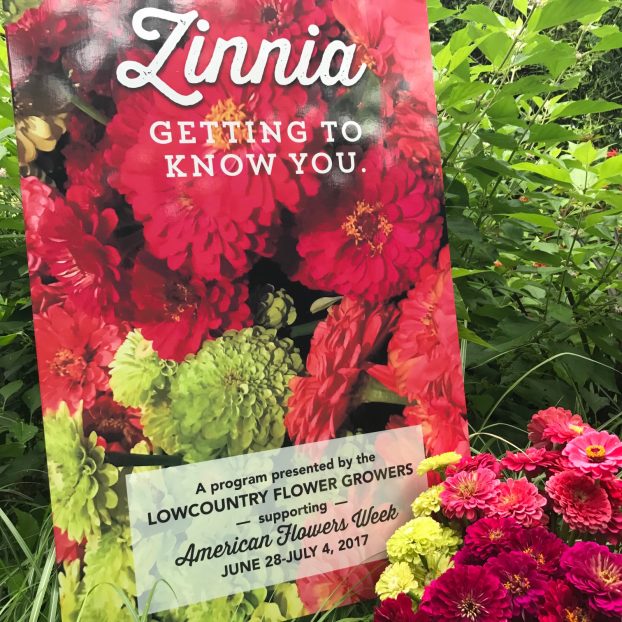
Flower farmers and floral designers threw design, education and arranging parties around the country during American Flowers Week. This signage announced the Zinnia-themed design event staged by the new Lowcountry Flower Growers at a Charleston, S.C.-area farmers market.
American Flowers Week inspired grocery stores like Town & Country Markets and New Seasons in the Pacific Northwest, Central Market in the Houston area and Whole Foods Markets in the Mid-Atlantic region. Farmer groups in the Southeast, in Maryland, in New York’s Hudson Valley staged flower arranging parties and partnered with creative florists, continuing to build community and educate floral designers and consumers in their marketplaces.
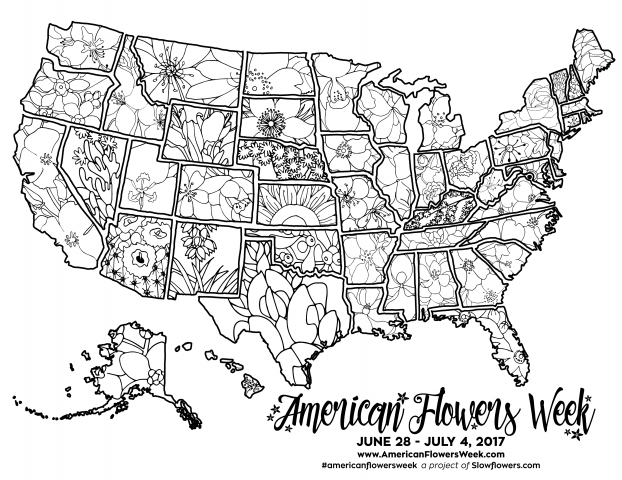
Get out your crayons: Our American Flowers Week Map of State Flowers!
In other places, florists created beautiful styled shoots and designed promotions to benefit charities, like Kathleen Barber of Erika’s Fresh Flowers, whose flowers raised funds for Northwest Battle Buddies, a nonprofit partnering combat veterans with professionally trained dogs.
The media paid attention, too, with feature articles appearing in leading trade magazine Florists’ Review and a beautiful spread by Janet Eastman in The Oregonian.
Be sure to check out our show notes and links to posts at AmericanFlowersWeek.com to see beautiful photographs of campaigns, photo shoots, inspired posts and other resources. And stay tuned for next month when we announced plans for 2018 and how you can get involved in the planning for even more exciting ways to promote you, your flower farm and your floral designs!
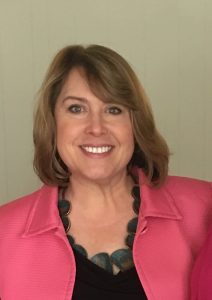
Rebecca Reed, US Sales Executive for David Austin Garden Roses
Next up, Rebecca Bull Reed of David Austin Roses. I’ve known Rebecca as a professional friend for years — dating back to 2002, 3 and 4 when I was just getting started with my garden writing career and Rebecca was a garden designer who worked in sales at one of my favorite shops in town called Herban Pottery.
We continued our friendship through the Garden Writers Association after Rebecca moved to the Southeast to join Southern Living Magazine as a garden editor there for nearly a decade. We would see one another at annual GWA symposia and I always wished there was a way to reconnect with her more than once in a while. I was so excited when Rebecca returned to the Pacific Northwest in 2014, where she is now based as the US Sales Executive for David Austin Roses.
She is an accomplished horticulturist and garden communicator specializing in David Austin English Roses, bare root roses, own root roses, sales, marketing, project management, lifestyle publishing, photo shoot story production, instructional writing, garden design, product promotion, education, and public speaking.
I’ve seen so many of the David Austin’s garden roses at the Seattle Wholesale Growers Market, most of which are supplied as cut flowers by Dawn Severin of All My Thyme, a past guest of this podcast. Hearing from Rebecca may make you want to go back and listen to last year’s interview with Dawn — you’ll be inspired to add more David Austin garden roses to your cutting garden or flower farm — and to incorporate these beauties into your floral designs.
Find/follow David Austin Roses at these social places:
David Austin Roses on Facebook
David Austin Roses on Twitter
David Austin Roses on Pinterest
David Austin Roses on Instagram
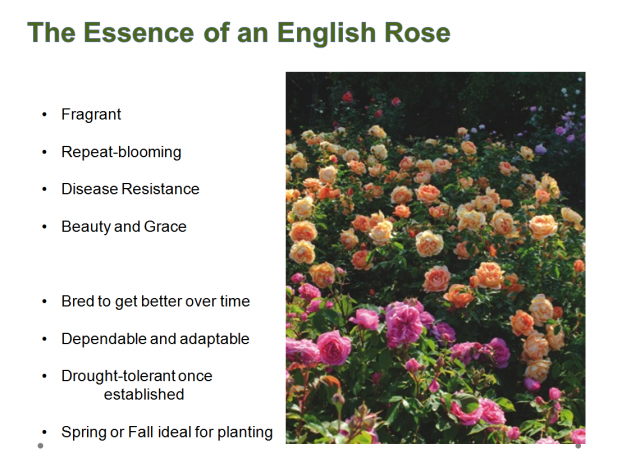
Rebecca generously shared some of her lecture slides for me to post here.
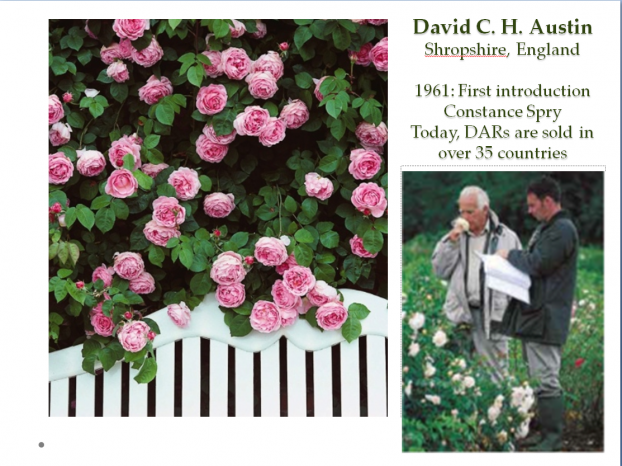
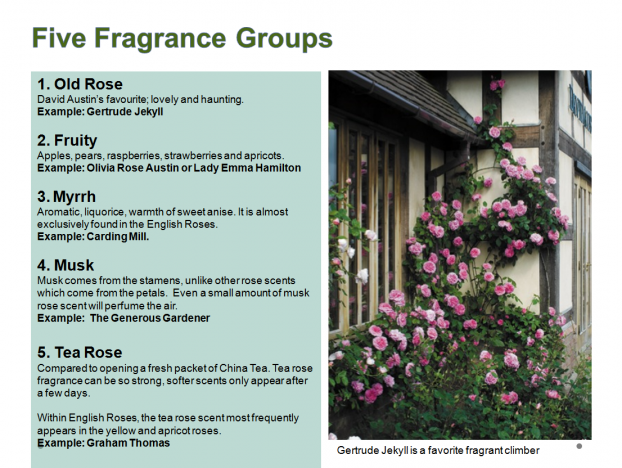
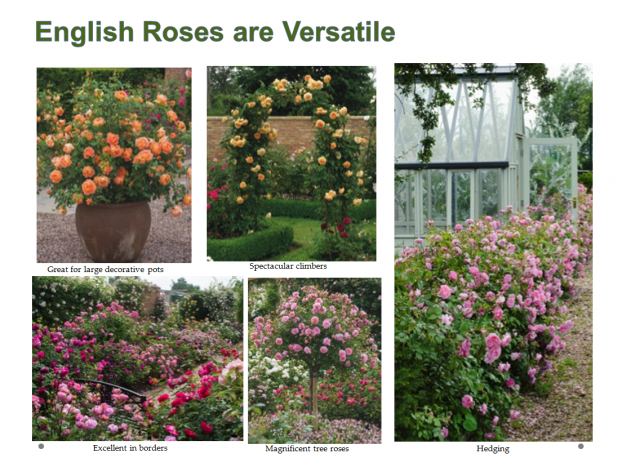
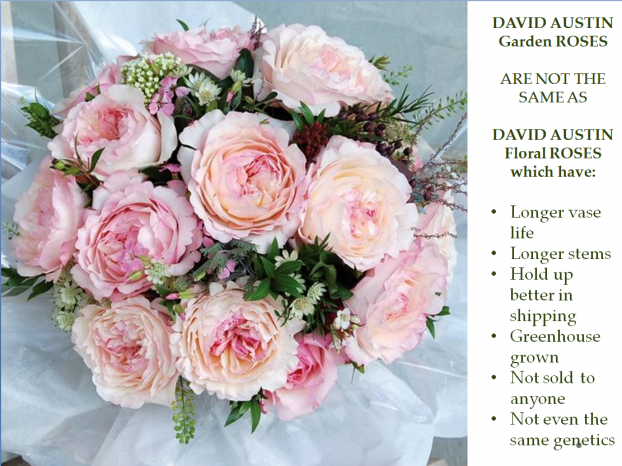
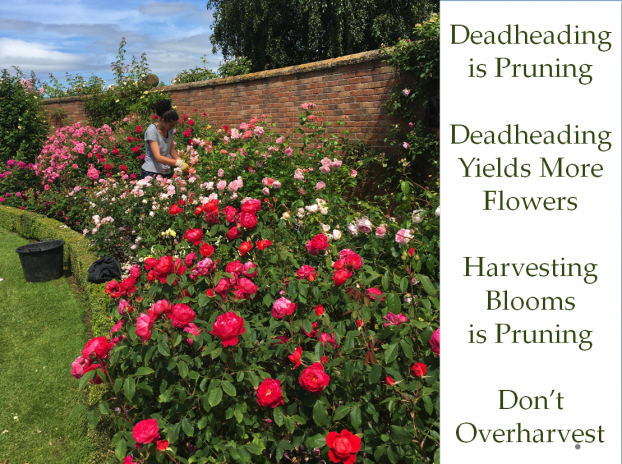

Thanks so much for joining me today. It has been a crazy month and I’m so pleased that you have joined the conversation to hear from leading voices in the Slow Flowers Movement.
The Slow Flowers Podcast has been downloaded nearly 210,000 times by listeners like you. Thank you to each one of you for downloading, listening, commenting and sharing. It means so much.
If you value the content you receive each week, I invite you to show your thanks and support the Slow Flowers Podcast with a donation — the button can be found on our home page in the right column. Your contributions will help make it possible to transcribe future episodes of the Podcast.
 Thank you to family of sponsors:
Thank you to family of sponsors:
Arctic Alaska Peonies, a cooperative of 50 family farms in the heart of Alaska providing high quality, American Grown peony flowers during the months of July and August. Visit them today at arcticalaskapeonies.com
Seattle Wholesale Growers Market, a farmer-owned cooperative committed to providing the very best the Pacific Northwest has to offer in cut flowers, foliage and plants. The Growers Market’s mission is to foster a vibrant marketplace that sustains local flower farms and provides top-quality products and service to the local floral industry. Find them at seattlewholesalegrowersmarket.com
Longfield Gardens provides home gardeners with high quality flower bulbs and perennials. Their online store offers plants for every region and every season, from tulips and daffodils to dahlias, caladiums and amaryllis. Visit them at lfgardens.com.
Syndicate Sales, an American manufacturer of vases and accessories for the professional florist. Look for the American Flag Icon to find Syndicate’s USA-made products and join the Syndicate Stars loyalty program at syndicatesales.com.
Johnny’s Selected Seeds, an employee-owned company that provides our industry the best flower, herb and vegetable seeds — supplied to farms large and small and even backyard cutting gardens like mine. Check them out at johnnysseeds.com.
Association of Specialty Cut Flower Growers. Formed in 1988, ASCFG was created to educate, unite, and support commercial cut flower growers. It mission is to help growers produce high-quality floral material, and to foster and promote the local availability of that product. Learn more at ascfg.org
I’m Debra Prinzing, host and producer of the Slow Flowers Podcast. Next week, you’re invited to join me in putting more American grown flowers on the table, one vase at a time. And If you like what you hear, please consider logging onto Itunes and posting a listener review.
The content and opinions expressed here are either mine alone or those of my guests alone, independent of any podcast sponsor or other person, company or organization.
The Slow Flowers Podcast is engineered and edited by Andrew Brenlan. Learn more about his work at KineticTreeFitness.com.
Music Credits:
Wingspan
by Blue Dot Sessions
Acoustic 1
by Dave Depper
Posted in American Flowers Week, American Grown, Blog Posts, Creativity, floral design, Flower Farming, Podcast Episodes, SLOW FLOWERS Podcast, Slowflowers.com the Directory of American Flowers | 1 Comment »
July 6th, 2017
Podcast: Play in new window | Download
Subscribe: Apple Podcasts | Podcast Index | | More
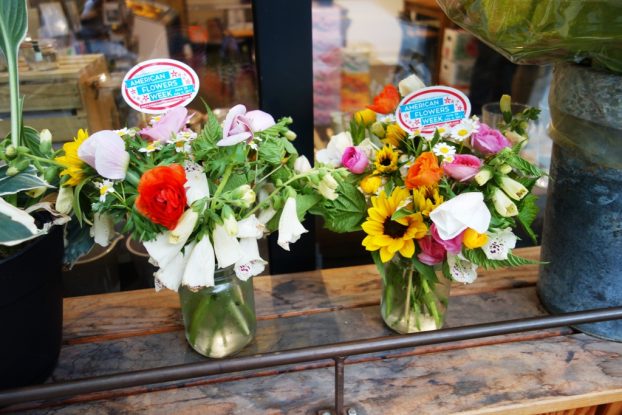
American Flowers Week bouquets from Triple Wren Farms
It’s July 6th and I’m still on a huge high thanks to the incredibly successful third annual American Flowers Week celebration which concluded with Independence Day in the U.S.
I will have a lengthier recap to share in next week’s episode — after all the numbers come in and after I’ve had time to compile highlights and accolades from around the country.
Suffice it to say that participation has reached new heights with American Flowers Week 2017. Last year, in the month leading up to American Flowers Week, the social media impressions hit 1.4 million on Instagram and Twitter. This year, we are at 4.9 million and counting, more than triple the impressions!
That is clearly only one metric but I’m happy we can point to it for validation that Slow Flowers has created something pretty awesome that everyone who touches American grown flowers can claim and adopt for their own place in the domestic floral scene — from our beloved growers to floral wholesalers, ecommerce, grocery stores and the floral artists and flower shops who connect consumers with their flowers.
Ultimately, it’s also for lifelong or passionate gardeners like me, those of us who fell in love with their flowers through horticulture and the simple act of clipping a bloom from plants we grow ourselves — and arranging them into a nosegay or posy to bring indoors.
I know we will continue the momentum all year long and I can’t wait to share all the news of 2017’s American Flowers Week, including our brilliant first-ever Slow Flowers Summit staged last Sunday on July 2nd. More in our full report next week.
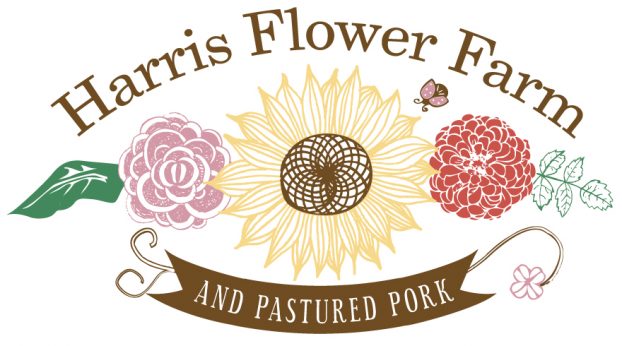
This week’s guest: Janis Harris of Harris Flower Farm in St. Thomas, Ontario, Canada
This week, we’re turning to our Canadian neighbors, where there’s an amazing flower farming and floral design community, with equally passionate kindred spirits like my guest Janis Harris of Harris Flower Farm.
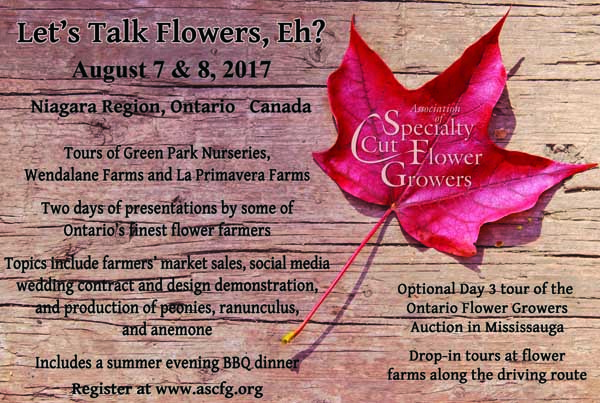 Janis is the Canadian regional director for the Association of Specialty Cut Flower Growers and she has been busy working on the group’s upcoming two-day conference called “Let’s Talk Flowers,” scheduled for August 7th and 8th in the Niagara region of Ontario.
Janis is the Canadian regional director for the Association of Specialty Cut Flower Growers and she has been busy working on the group’s upcoming two-day conference called “Let’s Talk Flowers,” scheduled for August 7th and 8th in the Niagara region of Ontario.
I am so pleased that Janis and I recently recorded this conversation to discuss the conference and give us more insights into her floral business and her farm. Enjoy the photos she’s shared here — of her flowers, floral designs and family farm life.
Here’s a little more about Janis and her family’s flower-filled business. There’s a twist, and that’s the other “crop” grown at their farm — husband Mark’s pasteurized pork livestock enterprise. You’ll hear more about THAT — and how flowers and piggies live in harmony in my conversation with Janis!
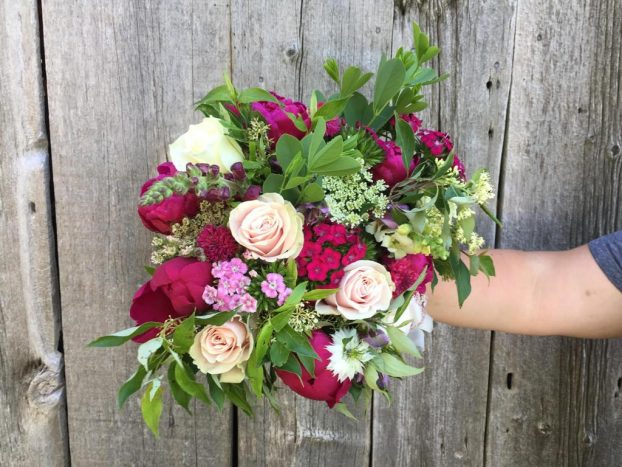
A Janis Harris-designed bouquet ~ beautiful!
Janis and Mark Harris and their three youngsters, Cameron, Nathan and Megan, live and farm just north of St.Thomas, Ontario. They have been going to the local market with their fresh cut flowers since 2010
Both Janis and Mark grew up on a family farm. Janis’ parents have an organic vegetable, poultry and beef farm and Mark’s parents have a cow/calf beef farm. They hope to instill the farm life and values to their children. Cameron already loves the farming life, he can be found playing with his tractor toys. Nathan loves helping in the fields picking and hauling in the flower harvests. Megan is already picking up tips on arranging flowers.
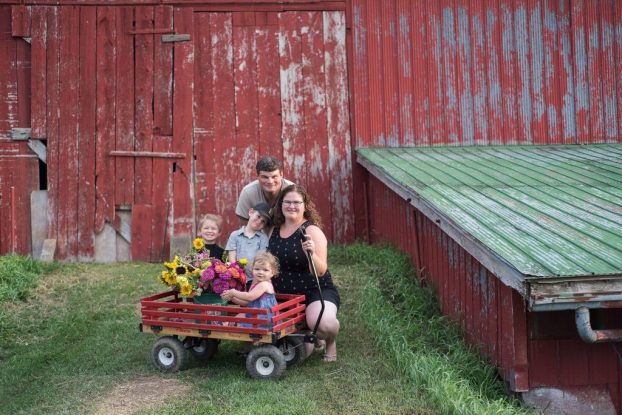
Janis and Mark with their three young children.
The fresh cut flower business is a family affair, everyone picks, packs and sells flowers. Cameron and Nathan have grown up at the market, they look forward to introducing Megan to the ins and outs of selling market bouquets.
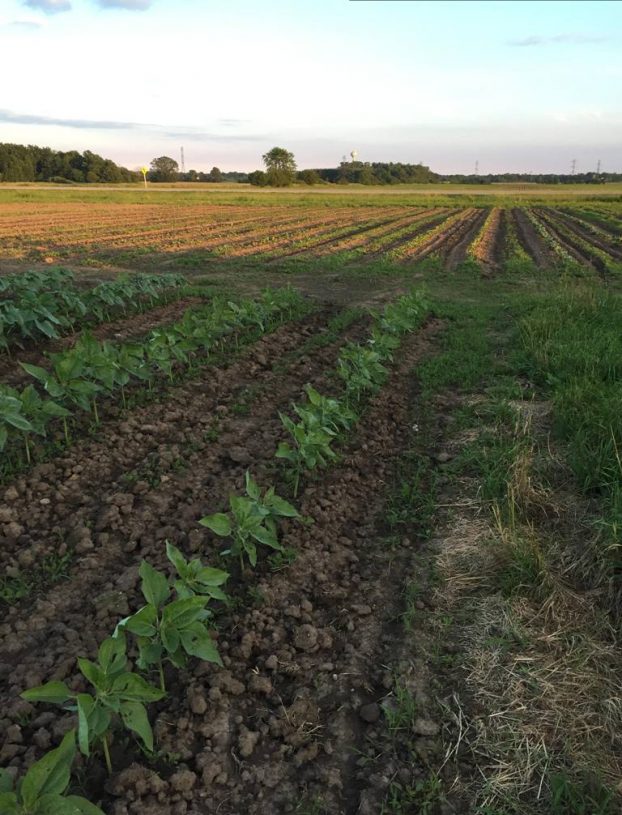
Harris Flower Farm
Mark and Janis purchased Janis’ Grandparents former dairy farm where Grandma and Grandpa’s love of flowers is apparent throughout the property. There are many established flower gardens filled with collections of lillies, irises, peonies and lilacs. Currently with 3 acres in flower production, the farm is flourishing. Former corn and soyabean fields have been turned into sunflower fields. Lawn has been turned over for perennial beds. The farm is being revitalized and beautified with every growing season. Every year the flowers we grow have increased in number and variety.
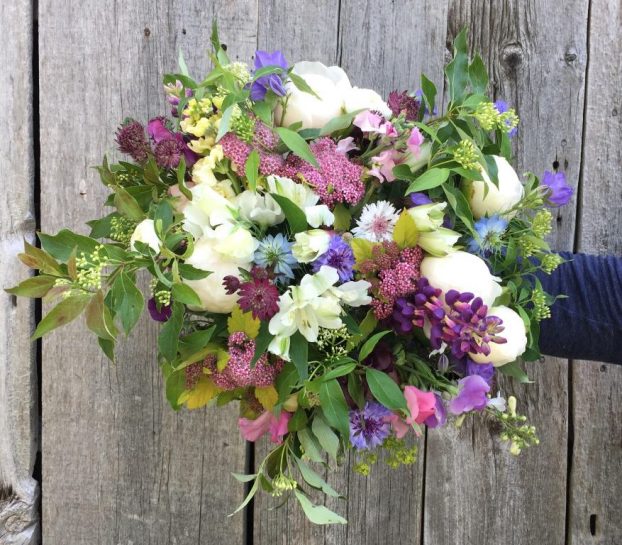
An abundance of fresh-picked botanicals!
As I mentioned, along with the flowers, pastured pigs are raised on the farm. Healthy, happy and MUDDY pigs.The pigs have access to outdoors and are cared for in the best way possible, hands on and one on one with each animal. You will often find Mark in the sows’ pens brushing them. Janis designs — literally – with her “Grandma’s garden” of flowers, as well as field production of flowers. She sells her mixed bouquets at the Horton Farmer’s Market every Saturday from Mother’s Day to Canadian Thanksgiving.
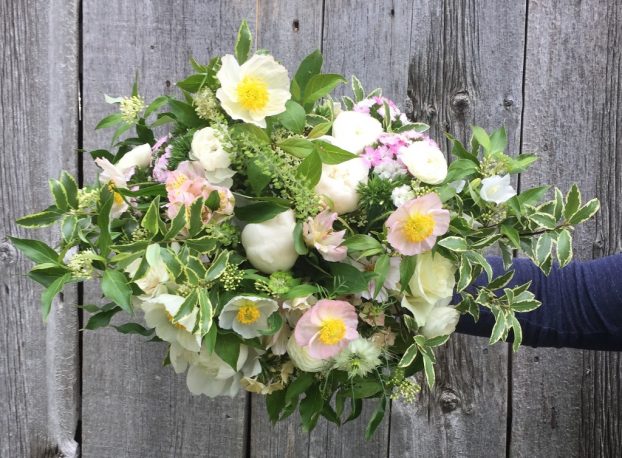
A pastel-hued bouquet
Here’s how to find Harris Flower Farm:
Harris Flower Farm on Facebook
Harris Flower Farm on Instagram
As we readied this episode for posting, the registration for ASCFG’s Ontario meeting has been so successful that there are now only about 6 or so spaces left for you to participate. Here is a link to ASCFG Conference Registration
And, the hotel reservation cut-off for the discounted rate of $119 is Thursday, July 6th. If you hear this information after that deadline, you can still grab a room, upon availability, but the rate may have increased. Here is the link to the hotel information.
 Thanks so much for joining us today.
Thanks so much for joining us today.
The Slow Flowers Podcast has been downloaded more than 207,000 times by listeners like you. The month of June witnessed the highest listenership ever — at 11,730 downloads! You helped the podcast surpass March’s listenership of 11,518 downloads.
Hey, that’s pretty amazing considering flower farmers are usually even busier with their duties in June than March — so hey, thank you to each one of you for downloading, listening, commenting and sharing. It means so much.
If you value the content you receive each week, I invite you to show your thanks and support the Slow Flowers Podcast with a donation — the button can be found on our home page in the right column. Your contributions will help make it possible to transcribe future episodes of the Podcast.
 Thank you to family of sponsors:
Thank you to family of sponsors:
And thank you to our lead sponsor for 2017: Certified American Grown Flowers. The Certified American-Grown program and label provide a guarantee for designers and consumers on the source of their flowers. Take pride in your flowers and buy with confidence, ask for Certified American Grown Flowers. To learn more visit americangrownflowers.org.
Arctic Alaska Peonies, a cooperative of 50 family farms in the heart of Alaska providing high quality, American Grown peony flowers during the months of July and August. Visit them today at arcticalaskapeonies.com
Seattle Wholesale Growers Market, a farmer-owned cooperative committed to providing the very best the Pacific Northwest has to offer in cut flowers, foliage and plants. The Growers Market’s mission is to foster a vibrant marketplace that sustains local flower farms and provides top-quality products and service to the local floral industry. Find them at seattlewholesalegrowersmarket.com
Longfield Gardens provides home gardeners with high quality flower bulbs and perennials. Their online store offers plants for every region and every season, from tulips and daffodils to dahlias, caladiums and amaryllis. Visit them at lfgardens.com.
Syndicate Sales, an American manufacturer of vases and accessories for the professional florist. Look for the American Flag Icon to find Syndicate’s USA-made products and join the Syndicate Stars loyalty program at syndicatesales.com.
Johnny’s Selected Seeds, an employee-owned company that provides our industry the best flower, herb and vegetable seeds — supplied to farms large and small and even backyard cutting gardens like mine. Check them out at johnnysseeds.com.
Association of Specialty Cut Flower Growers. Formed in 1988, ASCFG was created to educate, unite, and support commercial cut flower growers. It mission is to help growers produce high-quality floral material, and to foster and promote the local availability of that product. Learn more at ascfg.org
I’m Debra Prinzing, host and producer of the Slow Flowers Podcast. Next week, you’re invited to join me in putting more American grown flowers on the table, one vase at a time. And If you like what you hear, please consider logging onto Itunes and posting a listener review.
The content and opinions expressed here are either mine alone or those of my guests alone, independent of any podcast sponsor or other person, company or organization.
The Slow Flowers Podcast is engineered and edited by Andrew Brenlan. Learn more about his work at KineticTreeFitness.com.
Music Credits:
Turning on the Lights; These Times
by Blue Dot Sessions
Perfect (Instrumental Version)
Posted in Blog Posts, Creativity, floral design, Flower Farming, Plants, Podcast Episodes, SLOW FLOWERS Podcast, Slowflowers.com the Directory of American Flowers | 1 Comment »
© Debra Prinzing, all written and photographic content. Website design/development by Willo Bellwood/Metric Media



 I invite you to share your story, too — I’d love to hear it! You can find more stories about floral designers and farmer-florists in the inaugural issue of the Slow Flowers Journal — print edition — out now in the August issue of Florists’ Review.
I invite you to share your story, too — I’d love to hear it! You can find more stories about floral designers and farmer-florists in the inaugural issue of the Slow Flowers Journal — print edition — out now in the August issue of Florists’ Review. Thank you to family of sponsors for 2017:
Thank you to family of sponsors for 2017: I’m Debra Prinzing, host and producer of the Slow Flowers Podcast. Next week, you’re invited to join me in putting more American grown flowers on the table, one vase at a time. And If you like what you hear, please consider logging onto Itunes and posting a listener review.
I’m Debra Prinzing, host and producer of the Slow Flowers Podcast. Next week, you’re invited to join me in putting more American grown flowers on the table, one vase at a time. And If you like what you hear, please consider logging onto Itunes and posting a listener review.











































































